Publications [810]

Oct. 15, 2019
Publications

This working paper has been the basis for the introduction in the presentation made in the conference organized by the Journal of Regulation & Compliance (JoRC) on the topic : Compliance Tools, in collaboration with many Universities partners.
This first conference has been organized with the Sciences po Economic Department on November 28, 2019 on Risks Mapping.
This working paper is articulated with a second working paper, being the basis of the first development of this conference, on the caractère nouveau ou non en Droit de l'obligation de cartographie des risques.
These two working papers are the basis for two articles published in the collective book, Compliance Tools, in the Series Regulations & Compliance.

Updated: Oct. 8, 2019 (Initial publication: Nov. 22, 2018)
Publications

This working paper served as a basis for a conference done in French for the Centre de droit comparé (Center for Comparative Law) in Paris on 23 November 2018.
Updated, it has served as a basis for an article published in French in a book of the Société de Législation comparé (Society of Comparative Legislation).
________
"The whistleblowers". This is a new expression. Which wins a full success. Barely heard once, we hear it everywhere ...
A theme not only of academic teaching, but rather a topic of daily conversation. Because it is every day that we speak about it, in terms more or less graceful. For example President Donald Trump on October 1, 2019 told the press he "wants to interrogate" the whistleblower who would have unlawfully denounced him and would not have, according to him, the right to conceal his own identity, evidence in this according Donald Trump of the false character of his assertions against him, while his lawyer indicates on October 6, 2019 that he does not speak on behalf of a single whistleblower thus taken apart but of a plurality people who gave information against the President of the United States. Even the most imaginative scriptwriters would not have written twists as abruptly or so fast. Spectators, we wait for the next episode, secretly hoping for climbs and slashs.
Precisely if we go to the cinema, it is still a whistleblower whose dedication and success, or even drama, we are told, for the benefit of the global society, and especially of Democracy, since the secrets are fought for the benefit of the truth. Thus, the movie The Secret Man designates Mark Felt as the first whistleblower. Returning to what is often presented as a more "serious" media, for example in France the radio "France Culture" we can learn the story of a historian who worked as an archivist on events that the political power would have wanted to keep hidden by possibly destroying their traces but that his profession led to preserve
It is also a topic of legislative debate since in the United States the Dodd-Frank Act of 2010 inserted in the 1934 law that established the Securities & Exchanges Commission (SEC) a complete system for retribution and remuneration of whistleblowers, while after elaborating guidelines about about in 2012
In Europe, the Directive first approved by a Resolution of the European Parliament on 16 April 2019 on protection of persons reporting breaches of Union law and then adopted on 7 October 2019 (Directive 2019/78 (EU) of the European Parliament European Union and the Council of the European Union on the Protection of Persons Reporting Breaches of Union law, will have to be transposed in the next two years to the legal systems of the Member States. is not general, since only "violations of European Union Law" are targeted but the character of the "whistleblower" is more generally referred to: it is "whole"
In short, the whistleblower is a star
Recognized by national legislations, which associate to him a legal regime of protection to such a point that, like a tunic of Nessus, it is this legal regime which will define his character and not the opposite. When we read the French law of December 9, 2016 relative à la transparence à la lutte contre la corruption et à la modernisation de la vie économique (on transparency in the fight against corruption and the modernization of economic life), usually known as "Sapin 2 Act", we note that the lawmaker makes much of this character, because he devotes to him the chapter II: "De la protection des
But why a plural? Certainly when we read the recitals of the European Directive of 7 October 2019 on the protection of whistleblowers
Thus seem to contradict in this law "Sapin 2" itself the very title which presents the character, in that it uses a definite plural ("the whistleblowers") while the article of definition which presents the topic does it by using the singular indefinite : "a whistleblower....".
This is a first reason to move forward only in a very cautious way, in this "step by step" that constitutes a word-by-word reading: a gloss. This method consists in taking literally the expression itself. The second reason for this technical choice is that the gloss is well suited to an introduction of a collective work, allowing more specific developments to take place in other contributions, for example on the techniques, the difficulties and the limits of this protection, or the history of it, or the reasons for the arrival in French law of these American or Brithish whistleblowers and the way they develop, or not, in other legal systems or other countries.
I will therefore content myself with taking again literally this already legal expression: The (I) launchers (II) of alert (III).
See below developments.
On the more general fact that cinema is undoubtedly the medium which most seriously restores the state of the Law, c. Frison-Roche, M.-A., Au coeur du Droit, du cinéma et de la famille : la vie, 2016.
L'histoire du premier lanceur d'alerte, France Culture, septembre 2019.
European Commission, Guidelines on Whistleblowing, 6 of December 2012, SEC(2012) 679 final, updated on 23 of April 2018.
However, precisely the so common use of plurality ("whistleblowers") raises doubts about the uniqueness of the character. On this question, see. all the first part of the developments of this study, which leads to the conclusion rather than beyond the multitude of particular cases, there are rather two kinds of whistleblowers. V. infra I.
The director of the film La fille de Brest says that she considers the whistleblower at the origin of the case of the Pick as a "movie character".
Thus, the adventures of Snowden were brought to the screen by Oliver Stone in 2016, Snowden. On the question of knowing whether this film "faithfully reproduces" or not the case, Schetizer, P., Le film Snowden est-il à la hauteur de la réalité?, 2017. This article is favorable to the whistleblower, and to the film which tells us with emotion his case, in particular because (sic), it is easier than to read the Washington Post.
Underlined by us.
Underlined by us.
About this directive, v. the developments infra
Underlined by us.

Updated: Sept. 25, 2019 (Initial publication: June 17, 2019)
Publications
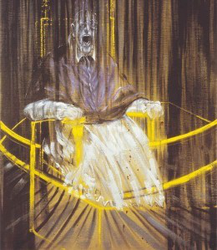
This working document is the basis for an article published in the Archives of Philosophy of Law (APD).
Summary: Painting so well that the canvas is a living object is a technical feat that was achieved by little
_______
In numerous writings and interviews, The painter Francis Bacon explains his act as a painter: it is "preserving the vitality of the canvas". In the book he devoted to it, Gilles Deleuze pointed out that Bacon said that "the procedures used do not force the Figure to stand still"
With the same pedagogical friendliness, in numerous writings and interviews, the jurist Carbonnier explains his act as a legislator, in particular in his collection of texts Essais sur les lois: legislate well, and let life unfold through texts, well after their adoption, because posed on pages which are never white, written compositions which are only the "varnish" of the life which must be able to throb in these Laws which one presents however so often but so strangely as "engraved in marble ". While on the contrary it is only a question of "preserving" the vitality of what is under the letter of the Law, the life of each one, life which does not resemble that of the neighbor, to obtain that the web of the legislative system is so flexible that this system lives by itself after the promulgation of the texts.
But it may seem to force the line to find elements common to two characters who undoubtedly were unaware of their reciprocal existence or at least, although living at the same time, did not appear similar. Before showing how similar their action is, therefore, put them face to face beforehand.
PREREQUISITES REQUIRED: FACING FRANCIS BACON AND JEAN CARBONNIER
Thus, the family painted in broad outlines by a few new articles of the Civil Code written by Carbonnier could nevertheless flourish afterwards, in each family, without the need to rewrite the text. One might be surprised that Carbonnier expressly only likes the Law and not the judiciary, this association of the Right to the Law often being worth rigidity; yet - and the formula made him famous - he conceived of the Law as only "flexible", without recognizing the judge as a general source of the Law, without recognizing him the power to soften over time the edge of the adapted law formerly, then once. In fact, the Flexible Droit volume brings together almost only texts relating to laws, while in his latest work, Droit et passion du Droit sous la Vième République, he challenges the influence of the courts over the Law.
Carbonnier abides by the Law. These laws which we are constantly told us that their quality should be never to move .... And to evoke in order to convince us the imperative of legal certainty, predictability, etc., each new report on the subject saying the same thing as the previous one, this one serving as a reference for the next one.
Thus, all these numerous works explain to us that, in the ideal towards which one should tend, the Law does not move in the main lines while the judge, by "jurisprudence" comes to adapt it and that thanks to "dialogue ", even to the" dialectic "between legislation and jurisprudence", cahin-caha we arrive at something suitable. In practice. And here is legal security well served, since it would be the only concern. A universal model to apply everywhere , at everything.
But this presentation, now very common and also constituting the vulgate of the economic analysis of law, does not correspond to the conception of Carbonnier, who did not admit the creative power of the Judge, being, like Motulsky, above all a jurist . Because if he asked as a question "Any law in itself is an evil?", It is only to answer it firmly: No, going so far as to compare in this article the announcement of a new law with the announcement made by the angel Gabriel.
Perhaps it is his attachment to the Law, his refusal to consider the jurisprudence as the source of the law, his respect for the legal matter itself that make his work today less cited than the work of sociologists who do not know not more the legal technique than the economists who describe the "legal regulation" to adopt to be effective? It should also be noted that its legislative art is little used today
It is true that to make a painting, to have the strength to fade in front of your canvas, you must master the technicality to return to the childhood of art, ambition of all artists, all teachers, all the Masters. Francis Bacon, also a wise reader of writers, rejecting the modern opposition between painted lines and written texts, repeated at each interview that he awaits "the accident" which comes alone to get the flesh out of the skin that traps him
The theme of Carbonnier Sociologie juridique's book is this necessary presence of law in a sociological analysis which would not betray the law presented while managing to keep its distance: that is to say, let it breathe, allowing us to watch live. This is why, like Truffaut, he took an interest in children's pocket money.
By a game of mirrors, Carbonnier explained, for example about the reform he conceived of the Law of matrimonial regimes and whose genesis he explained in an article in L'Année sociologique
Admittedly, one could underline that if Francis Bacon signed his tables, which attaches to him the work and holds the Figure which moves there, it was not the case for Carbonnier. You must already be a scholar to know that the author of the train of reforms of the XXth century which transformed the Civil Code has for patronym "Jean Carbonnier": the Legislator is an abstract character, who, like the State, always carries this same title , like the King, and passes indifferently from head to head, from the dead instant to the crowned instant. Whoever looks at the painting will attribute it to Francis Bacon because it is written on it, while on the contrary he will designate for example the law of July 15, 1975 as the law reforming the law of divorce, without referring to the human being who designed it. Yes, it is the Parliament, which, in the name of the People via the Representation, is the author of the Laws. And not such and such.
So the comparison would not be worth. But let's take a detour by Romain Gary. The action of this one showed what one could call "the right of the literature", ie what can go the power of this one. Its power is so great that the author can never appear in it
There is no need to go to Law & Literrature, a current which dries up the Law rather to cover it with a conception of the Law as a fabric of strategic lies and retrospective narratives of justification of decisions. No, Carbonnier, far too erudite and far too good a jurist to go towards a thought above all critical of an object, made sociology to show us a living Law and at the same time had a sociological conception of Legislative Art , writing laws which capture in their austere lines the daily and various lives which will come after the writing of a law which writes only in capital letters, general, aiming nothing special so that the particular remains in the hands of each individual
But how, if we get the judge out of the normative game, can the law be "flexible"? If not by drawing up laws which "preserve" in themselves, in their "canvas" even their vitality, which allows them to move, in an ink which must never be dry or reach marble?
Why not make the connection between the two creators, Francis Bacon and Jean Carbonnier?
How even not to do it, the design and the method are so similar to them.
When Bacon paints scenes of daily life as a field of ruin, while Carbonnier aims only "the interest of the child", on which one glosses so much, only as "a key which opens on a vacant lot"
For the two authors, painting for one and the law for the other, both must tear them away from their static support so that there is expressed and "preserves" life in its mobility itself. Even more, it is thanks to this support, which we thought motionless, that the fluidity of life appears to us. Thus life is, for them, the common object of painting and the law. This definition is carried by few people, because we find so often in the presentations which are made of the Law the imperative of a choice to operate, to put on the side of the immobile or on the side of the mobile, but not this conception of mobility expressed by an immobile support (I). It must be recognized that few have the level of technical mastery and thinking of Bacon and Carbonnier.
But if we go back to Carbonnier's conception of the law, while at a distance, as would do, in his own words, in his own country a "foreign" legislator

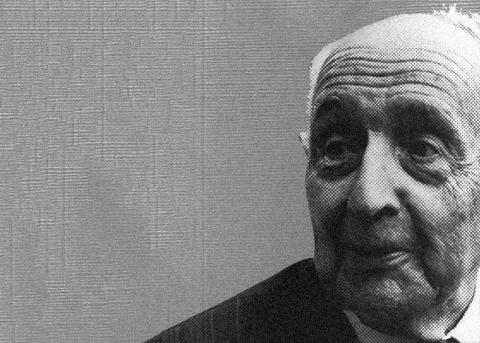
The two authors thus put life at the center, one of the tables, the other of the laws. Yet two motionless objects, some made of "canvas", others made of "marble".
But both wanted - emphasizing the difficulty of the task - forcibly reinserted into the materially intrinsic immobility of the object - the canvas of the table that the flaking of the paint by the passage of time will damage , the letter of the Law that subsequent reforms will challenge - life. That is to say, finally give them their true object. And yet impossible to restore. And they got there. Undoubtedly by their own qualities: mastered technicality, modesty, perseverance, effacement before life itself which unfolds and occupies all the space and "does its work" on the support, which becomes mobile. Thus Francis Bacon's paintings move as the laws written by Carbonnier live, which is natural since it was directly inserted. What modesty was it worth to fade to this point.
Achieve by technical prowess that life is still throbbing in the canvas, in the text published in the Official Journal. Only in what by nature is fixed: the canvas, the Law, not only does life still throb, as if by "inadvertence", as Francis Bacon says, because life has a hard life, but because the masters that they were so delicate and so masters of their Art that they made everything that it was the very object of their work: the canvas of the picture was for Francis Bacon what life was made of, the marble of the law was for Carbonnier that by law life was made.
So as when the Master of Sewing removes the thread, the canvas no longer exists, the diary has long been lost, but life is still there. This is no coincidence, as sociologists who seem to boast of knowing nothing about law seem to present, speak of a "legislative vacuum" and always ask for more "new laws", sometimes stressing that Carbonnier was also arbitrary in law that bad in sociology - because there is to say it.
On the contrary, it is the Law bringing to its perfection: practical art, the Law relates to life and if in advance, in its very conception, it knows how to fade in front of life, it then joins in practice the art of painting because it takes a painter to force life on canvas (I). This requires a painter, because we often talk about legislative art but it is also appropriate to talk about artists who hold the pen. These do not "regulate", they draw a picture which, through the effect of correspondence, can let life continue to unfold because the ink is never dry. Of this table, it is the law which forms the framework, a light framework which allows to keep contours to what is the Right and what is not. Carbonnier always knew that in relation to life, Law was only a "thin varnish". Like all great masters, it was modest, drawing up great pictures, that were the complete reforms of the Civil Code that he wrote, never forgetting to conceive them only as a varnish so that life always finds its way out, breathe, in the same movement of a woman coming down the stairs or of a Pope who rules on his throne (II).
Il est remarquable que pour Bacon, Van Gogh, que le premier considére comme un "héros", a peint d'une "façon littérale" et que c'est grâce à celui qu'il a pu grâce à son "technicité" restitué "la vie" désertique du paysage.
Deleuze, G., Francis Bacon, rééd. par Badiou, A. et Cassin, B.,
...., in Verdier, R. (dir.), Jean Carbonnier. L'homme et l'oeuvre.
Comment dès lors ne pas penser à la définition de l'écriture par Céline, la définition comme le fait de tanner sa peau sur la table de l'écrivain ?
Terré, Fr., Jean Carbonnier et l'année sociologique, L'Année sociologique, 2007/2, vol.57, pp.555-569.
"le droit de la littérature est de n'y apparaître jamais comme auteur".
Comme le souligne très bien Frédérique Niboyer, pour montrer que les lois actuelles qui visent tous le cas possibles (ce qui est impossible) empruntent une méthode contraire à celle de Carbonnier : ""Le doyen Carbonnier avait une autre conception : une loi générale devait pouvoir s’adapter à tous (d’où le pluralisme du droit de la famille) tout en ouvrant des champs à d’autres ordres normatifs, alors qu’aujourd’hui le « légicentrisme » devient roi : la seule norme à laquelle on fasse confiance serait ici la loi qui, partant, doit être spécialisée pour chaque catégorie.".
Cité par Frédérique Niboyet, L'héritage de Carbonnier dans le droit matrimonial actuel : entre continuité et rupture, 2012, n°5.
Carbonnier, "A beau mentir qui vient de loin",

Updated: Sept. 24, 2019 (Initial publication: Aug. 31, 2019)
Publications

Summary : In August 2019, about the fire devastating the Amazon, the French Minister of Ecology says that this fact "is not just the business of a state" (n'est pas que l'affaire d'un Etat). This assertion denies the postulates of Public International Iaw (I). This supposes a new system, based on the idea that the power of the State on its territory is erased when the object that is there is no longer related to this "part" but to the All that is Universe (II). Let's accept the augur. First question: if it is not only the case of a State, whose business is it? (III). Second question: to anticipate the other cases that fall under this regime, what should be the criteria in the name of which the All will have to prevail over the part and who will then take care of the case of which the "local" State is divested? (IV). Because the perspective goes beyond the environment, beyond Brazil, beyond the States. It leads to Compliance Law animated by "monumental goals" that are the concern for the Universe and humans, in a humanist spirit. Let's go.
___
On August 27, 2019, on the French radio France Inter, Elisabeth Borne, French Minister of Ecology (Transition écologique) expresses it clearly: "Quand on est sur un enjeu tel que l'Amazonie, ça n'est pas que l'affaire d'un État", that can be translated : "When we are on a stake such as the Amazon, it is not only the business of one State ".
Starting from one case, "the Amazon", the Minister, thus taking up the position of the French President, associates a general consequence: "it is not only the affair of one State".
This is not a trivial sentence.
This affirmation denies, and why not, the entire system of Public International Law (I). By a new reasoning based on the idea that the All prevails, as by an effect of nature, on the Part (II).
Admitting this, it leads to opening two sets of questions. The first is related to the following main question: if it is not only the case of one State, of which is this the concern (III)? The second set of questions revolves around the questioning of the criteria on behalf of which other cases must be seized in the name of "All " and how to do it (IV).
A. The postulate of Public (and Private) International Law: parties (States) which, because of common interests, are in contact
The notion of State includes in its very definition the notion of territory (a territory, a population, institutions).
Thus the State governs through its institutions what is happening on its territory. For example, if there is a fire, or a risk of fire, the State makes arrangements through all legal, financial, technical and human instruments available to it. It is accountable for what it does through its political and legal responsibility.
When what is happening on its territory exceeds this one, in fact (epidemic, catastrophe with the consequences exceeding the borders, migrations, etc.) either according to its own opinion or according to that of the other States, the States, being sovereign subjects of Law in the international system, act together on a pre-built legal basis: bilateral or/and multilateral treaties!footnote-1675, having created legal integrated zones (like the European Union or the United States) or international institutions (like the IMF).
A particular technique has been developed for several millennia - but here again the seniority is not sufficient to keep the system: diplomacy, anchored in each state in a particular ministry: the Ministry of Foreign Affairs, which each national government has. If one State totally excludes one phenomenon in the territory of another, the progressive procedure of ceasing diplomatic ties begins.
This can result in wars.
In the "case of the Amazon" both the President of Brazil and the President of the United States stick to the classical construction of Law.
Indeed, the former asserted that the Amazon is in the territory of Brazil, thus falls under the jurisdiction of the power of the Brazilian State and the Brazilian Law, from which it follows that another State does not have to come to interfere. However, the French President takes the floor not as this forest extends also on a French territory but as it is the business of the World. On the contrary, the President of Brazil claims the closing effect, which excludes a third State from taking over directly something - even a difficulty - that takes place in the territory of another.
The President of the US federal State has said that these are joint decisions between the President of Brazil and other heads of State, sovereign subjects of Law, who must agree to organize a solution to solve a local problem . Because in the same way that States can declare war, they can help each other!footnote-1676.
The whole Public (and Private) International Law is therefore based on this assumption: "parts" of the world, on which sovereign parties (States) have taken contact, because circumstances make something that falls within one of them or several others.
This is precisely what is called into question. The notion of the "right of interference", whose evocation we hardly hear any more, had already done so. But on another basis.
B. The "right of interference": idea that somebody can directly interfere with what happens in a country , an idea that does not question the postulate of the International Maw, an idea that rests on something else: a " right for the other "
The "right of interference" is the idea that in certain territories, things happen that are inadmissible.
In memory of the jus cogens, a kind of "Natural Law" of Public International Law, Another, that could be another state, can come to meddle with what is happening in a territory that is closed, without declaring war. to the state that keeps its borders.
It is the need of others, for example those who die in mass on this territory, or the nature that is devastated in the indifference of the State on whose soil the disaster is happening, which founds this "right" of another state to come and take charge.
The foundation of this "right" is therefore a "duty".
C. The new idea: a territory is only part of the Globe, whose fate is everyone's concern
The idea is new because it is not based on altruism. And no more about self-interest. Yet, de facto and de jure , the Amazon is not on the sole territory of Brazil.
France is particularly well placed to say something about it since part of the Amazon is on French territory.
Thus the inaction of the main concerned Brazil directly affects the interest of France, a "forest" being a block that can not be divided. If we were in Property Law, we would say that we are in indivision with Brazil and that in this respect, with the other States on whose territories this forest extends, a solution must be found.
Because of the indivisibility of this particular object which is this particular fores!footnote-1644, it is necessary that the States whose territory is concerned have a say in the matter.
But this is not the argument put forward by France, particularly by the President of the Republic.
It is said that the whole world is concerned about the fate of the Amazon. It could be said that, in this respect, when what could be described as a "global forest" is well treated, its management does indeed fall within the power of Brazil, Brazilian companies and the Brazilian State, but when it is abused to the point of seeing its future compromised, when fires may make it disappear, then this forest appears not to be localized in Brazil but being located in the World, of which Brazil is only a part!footnote-1648.
This reasoning, which then gives voice to everyone, for in the world every state is included in it, is a new reasoning.
The economic-political theory of the "commons" does not account for it because it is not a very legal theory!footnote-1656.
II. THE NEW REASONING THAT COVERS THE CLASSIC REASONING OF PUBLIC INTERNATIONAL LAW
The new reasoning adopted by the Minister consists in saying that the Amazon does not concern only Brazil. This forest should therefore be directly related to the World (A). This is a welcome change in the system but based on a paradox (B).
A. When the Amazon is in danger of death, then it should no longer be attached to this part of the World that is Brazil, but directly to the World
This forest is presented as the "lung" of the planet, it is the "future" of humanity. In this, it can concern only one State, not even the one on whose territory this "Humanity good" is located!footnote-1643.
As such, without the need to declare war to Brazil, another State may speak, for example the French State through the one that represents it in the international order, that is to say its President, to say what to do, since according to him the President of Brazil does not say or do what it is absolutely necessary to do for the whole planet and for the future of Humanity.
This induces a complete renewal of international institutions.
Indeed a direct attachment to the World and no longer to Brazil gives the forest object a special status because of a goal that exceeds Brazil: save the Amazon would impose because it would save the world. Therefore, it can no longer be the subject of Brazil, which would be like "dispossessed" by a goal that is imposed on it: to save the Amazon rainforest, even though it is mainly on its territory, while other States become legitimate to dispose of this object, even if the forest would not be in part in their territory, even if they would not be affected in their own interests.
This contradicts all Public International Law!footnote-1645; because the agreement of the political representatives of Brazil is no longer required and no one yet evokes the need to declare war to Brazil, and fortunately!
Such an upheaval justifies that such an affirmation is accepted with difficulty. One understands better than first consequence, which is not so innocuous, one of the first rules of diplomacy which is the politeness, between the heads of state, with regard to the spouses of these , have be broken!footnote-1657, that the remarks have slipped on personal questions, etc.
B. A welcome but paradoxical change in the system
Why not change the system?
This is difficult to admit, not only because it is brutal, but because it is paradoxical.
The paradox is the following. It is recognized that the theme of the disappearance of borders by "globalization"!footnote-1647 no longer reproduces the reality of facts!footnote-1646, especially not the Chinese situation, the digitalization having on the contrary allowed the construction of even stronger boundaries. What we called "globalization" now belongs to the pastWhat we called "globalization" now belongs to the past!footnote-1660. So today we should recognize on one side the reality of borders - which had not disappeared or are reborn - but only to better step over them, since - based on the concern of the world - states, yet each in their borders, would be legitimate to go directly to intervene in the business of others.
The paradox is therefore, on the one hand, the rejection of the allegation of a de facto disappearance of borders by an economic interdependence, technology having denied "globalization" as a fact !footnote-1649 and the linked resurgence of borders allowing States to affirm more than ever that they would be "sovereign masters at home", which should logically lead to let Brazil decide for the Amazon, while yet on the other side we witness the questioning of the postulate of Public International Law as recognition of sovereignty and construction from agreements between states, requiring the agreement of the state whose territory is concerned (except war), questioning which leads to allow all to meddle with the fate of the Amazon, as if there was no border.
This paradox leads to two questions.
The first question is: if "it's not juste one State affair", who's concerned?
The second question is: after the "case of the Amazon", what are the other cases? And how are we going to provide solutions, if we no longer have the solutions of Public International Law, that is to say, the agreement of the country whose territory is concerned and which we do not want not go to war?
If we have clear ideas on the answers to be given to these two sets of questions, then because indeed when the future of all is in progress it can not be the affair of a single State, it is necessary to question Public International Law. But do we have clear ideas on these two questions? And what are the possibilities for possible solutions?
See the text following below.
Updated: Sept. 5, 2019 (Initial publication: April 30, 2019)
Publications
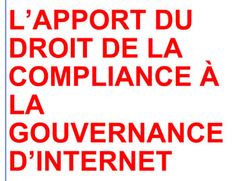
🌐 follow Marie-Anne Frison-Roche on LinkedIn
🌐subscribe to the Newsletter MAFR Regulation, Compliance, Law
____
► Full Reference: M.-A. Frison-Roche, L'apport du Droit de la Compliance dans la Gouvernance d'Internet (The contribution of Compliance Law to the Internet Governance), Report asked by the French Government, published the 15th of July 2019, 139 p.
___
► Report Summary. Governing the Internet? Compliance Law can help.
Compliance Law is for the Policy Maker to aim for global goals that they require to be achieved by companies in a position to do so. In the digital space built on the sole principle of Liberty, the Politics must insert a second principle: the Person. The respect of this One, in balance with the Freedom, can be required by the Policy Maker via Compliance Law, which internalises this specific pretention in the digital companies. Liberalism and Humanism become the two pillars of Internet Governance.
The humanism of European Compliance Law then enriches US Compliance law. The crucial digital operators thus forced, like Facebook, YouTube, Google, etc., must then exercise powers only to better achieve these goals to protect persons (against hatred, inadequate exploitation of data, terrorism, violation of intellectual property, etc.). They must guarantee the rights of individuals, including intellectual property rights. To do this, they must be recognized as "second level regulators", supervised by Public Authorities.
This governance of the Internet by Compliance Law is ongoing. By the European Banking Union. By green finance. By the GDPR. We must force the line and give unity and simplicity that are still lacking, by infusing a political dimension to Compliance: the Person. The European Court of Justice has always done it. The European Commission through its DG Connect is ready.
► 📓 Read the reporte (in French)
📝 Read the Report Summary in 3 pages (in English)
📝 Read the Report Summary in 6 pages (in English)
____
► Plan of the Report (4 chapters): an ascertainment of the digitization of the world (1), the challenge of civilization that this constitutes (2), the relations of Compliance mechanisms as it should be conceived between Europe and the United States, not to mention that the world is not limited to them, with the concrete solutions that result from this (3) and concrete practical solutions to better organize an effective digital governance, inspired by what is particularly in the banking sector, and continuing what has already been done in Europe in the digital field, which has already made it exemplary and what it must continue, France can be force of proposal by the example (4).
____
📝 Read the written presentation of the Report done by Minister Cédric O (in French).
____
💬 Read the interview published the 18 July 2019 : "Gouvernance d'Internet : un enjeu de civilisation" ( "Governing Internet: an Issue of Civilization"), given in French,
📻 Listen the Radio broadcast of July 21, 2019 during which its consequences are applied to the cryptocurrency "Libra" (given in French)
🏛 Presentation of the Report to the Conseil Supérieur de l'Audiovisuel- CSA (French Council of Audiovisual) on Septembre 5, by a discussion with its members presentation (in French)
💬 Read the Interview published the 20 December 2019 : "Le droit de la compliance pour réguler l'Internet" ("Compliance Law for regulate Internet"), given in French
____
read below the 54 propositions of the Report ⤵️
Aug. 22, 2019
Publications

En matière de Compliance, il y a deux sujets à la fois très importants et très incertains : celui de l'admission ou non des technologies de reconnaissance faciale ; celui de la forme et et de la place du "consentement" quelque soit la technique de captation, conservation et utilisation de l'information.
Le cas soumis à l'Autorité suédoise de protection des données (Datainspecktionen) et rapporté par la presse, croise les deux.
I. LE CAS
Une école suédoise doit en application de la loi nationale faire l'appel de chaque élève à chaque cours. Une Ecole supérieur a calculé que cette tâche, qui incombe donc à chaque enseignant en début de cours, représente un nombre d'heures important, qui pourrait être mieux utilisées par ceux-ci. Elle demande donc à une entreprise de technologie, Tieto, de développer pour elle des technologies qui redonnent aux enseignants leur temps.
L'entreprise Tieto conçoit un programme pilote, comprenant un procédé de reconnaissance faciale par la pupille de l'oeil, comptant ainsi les élèves présents. Les 21 élèves qui suivent le programme pilote apportent leur consentement express pour l'ensemble des technologies utilisées, notamment celle-ci.
Mais en février 2019 l'Autorité suédoise de surveillance, d'inspection et de protection des données poursuit l'entreprise qui a fourni cette technologie et l'école qui en a bénéficié pour violation du Réglement européen dit "RGPD".
L'école se prévaut du consentement libre et éclairé qui lui a été apporté par les élèves, tandis que le fournisseur de la technologie justifie l'usage de celle-ci par le fait qu'ainsi l'équivalent de 10 emplois à plein temps sont annuellement économisés pour des tâches mécaniques.
II. LA SOLUTION
Ces moyens n'ont pas convaincu l'Autorité.
Sur la question de l'efficacité du procédé, il ne semble pas même y être répondu, car tous ces mécanismes sont à l'évidence performants, car la protection des personnes est sans conteste coûteuse.
Mais sur la question du consentement, il est mentionné que le moyen tiré du consentement des élèves n'est pas retenu en raison du fait qu'ils n'étaient pas autonomes de l'établissemnt bénéficiaire de la technique de reconnaissance et qu'à ce titre le consentement n'avait donc pas de portée.
L'usage de cette technique est donc interdicte.
Mais l'Autorité ne se contente pas d'une interdiction. Elle indique qu'il convient, puisque les opérateurs en sont encore au stade d'un programme pilote d'ensemble de trouver ce que l'Autorité appelle un mode de contrôle des présences "moins intrusifs", car c'est en tant que l'ensemble prenait les élèves dans leur environnement toute la journée que cela n'était pas admissible.
III. LA PORTEE
Ce n'est pas donc une décision de principe.
C'est plutôt une décision d'espèce, en raison des circonstances qui vont que d'une part le consentement ne traduisait pas une volonté libre. Si les élèves n'avaient pas été ce que l'Autorité appelle la "dépendance" de l'établissement, alors sans doute leur acceptation de ces contrôles aurait eu de la portée.
S'il faut trouver un principe, il est par déduction celui-ci : le "consentement" n'est pas une notion autonome, suffisant à elle-seule à valider les technologies au regard du RGPD. Ce n'est qu'en tant qu'elle traduit une "volonté libre" que le "consentement" a pour effet de soumettre la personne qui l'émet à une technologie qui pourtant la menace autant qu'elle la sert.
C'est bien ce lien entre "consentement" et "volonté" que le RGPD veut garantir. C'est bien ce lien - de nature probatoire -, le consentement devant être la preuve d'une volonté libre, que le dispositif de Droit de la Compliance veut protéger.
Dès lors, si l'émetteur du consentement est dans une situation de dépendance par rapport à l'entité qui bénéficie de la technologie (par exemple et en l'espèce l'école qui fait des économies grâce à la technologie, sans que cela n'apporte rien à l'élève), la présomption comme quoi son consentement est la preuve d'une volonté libre est brisé : c'est pourquoi le consentement ne peut plus valider l'usage de la technologie.
Sur la question du rapport entre le "consentement" et la "volonté" : v. Frison-Roche, M.-A., Oui au principe de la volonté, manifestation de la liberté, non aux consentements mécaniques, 2019.
-----
Aug. 18, 2019
Publications

Le journal Les Echos nous le raconte.
Une personne physique sort le 15 août 2019 un rapport négatif sur une grande société cotée, General Electric (GE) en critiquant la façon dont celle-ci a évalué des risques liés à des titres financiers d'assurance qu'elle possède.
Cette personne, en diffusant une telle information, lance donc une alerte. Comme toute information, elle se répand immédiatement sur les marchés financiers.
Cela peut être un document comme un autre, chacun pouvant publier ce qu'il veut sur ce qu'il observe et formuler une opinion sur ce qu'il voit, anticipant telle ou telle conséquence.
Mais il se trouve que l'auteur est Harry Markopols.
Non pas que celui-ci soit particulièrement suivi pour des titres prestigieux (universitaires, etc.) ou des fonctions (régulateur ou juge, etc.), mais il se trouve qu'il avait révélé le comportement dissimulé - c'est le moins que l'on puisse dire - de Madoff.
Les marchés non seulement l'accréditent immédiatement du fait qu'il ait révélé une nouvelle "dissimulation" et en tirent la conséquence : le titre GE perd 10 %, parce que l'information qu'avait donnée GE sur son risque est désormais considérée comme fausse puisque celle donnée par Harry Markopols est considéré comme vraie.
Le cas est intéressant en ce que quelques jours ont suffi pour reprendre en cause ce scénario. Ce terme est sans doute adéquat en ce que le "lanceur d'alerte" correspond à un "personnage" de films plus qu'à une catégorie juridique. Et l'on en voit ici les inconvénients.
Ils sont ici de deux ordres. Le premier est le rythme qui fait que le "lancement" est immédiat, le dommage avéré, et que plus que jamais l'absence de catégorie juridique du lanceur d'alerte, personnage romantique et désintéressé ce qui ne renvoie à rien dans un système juridique qui a la sagesse de n'avoir pas ce romantisme, permet à n'importe qui de nuire. La solution française qui contraint à l'alerte interne montre sa supériorité. Car ce n'est pas tant de qualification juridique de la personne que de procédure dont nous avons besoin que de procédure. Or, pour l'instant de procédure à suivre avant de publier des "rapports" sur des entreprises, il n'y en a pas.
I. L'INCONVENIENT DE L'ABSENCE DE DEFINITION DU LANCEUR D'ALERTE DANS LE SYSTEME DE COMMON LAW
Conforme à sa tradition de Common Law, le Droit américain a fait connaissance avec le lanceur d'alerte à travers des cas, le cas Enron étant l'un des plus fameux. Il s'agit dond d'un héros.
A une époque où l'on recherche chez les super-héros le modèle du manager parfait, où l'on présente le lanceur d'alerte parfois comme un martyr, où de nombreux biopics sont consacrés à sa gloire, l'enfermer dans un statut serait comme l'étrangler.
C'est donc dans sa pleine liberté que le lanceur d'alerte extrait l'information que personne n'a, que l'entreprise veut dissimuler, que chacun pourtant gagnerait à avoir, et la donne à tous. Dans cette époque en quête de religiosité, il y a du Saint-Sébastien dans ce lanceur d'alerte contre lequel les Etats et les entreprises lancent tant de fléches, tandis que les réseaux sociaux le soutiennent.
Mais ici le problème technique qui apparaît est celui de la fiabilité de l'information. Car personne n'est en mesure techniquement de mesurer s'il y a eu ou non sous-évaluation des risques liés à ces produits... En Droit, et selon un principe général, ce qu'affirment les mandataires sociaux est présumé exact jusqu'à ce que l'inexactitude en soit démontrée. Or, ici l'exactitude de la dénégation par le lanceur a été créditée pendant quelques heures, uniquement par un effet de réputation.
Il a suffi que l'on apprenne qu'il a été payé par un opérateur de marché pour écrire ce rapport destructeur pour que les comportements s'inversent : le cours cesse d'être attaqué et devienne soutenu.
Comme le souligne à juste titre l'article des Echos, cela ressemble à une manipulation de cours et l'Autorité des marchés financiers, la Securities & Exchanges Commission (SEC) va certainement ouvrir une enquête.
Mais suffit-il d'être payé par un fonds pour cesser d'être pertinent ?
Non, ce qui est mis en doute c'est le rapport lui-même, dont la méthodologie - d'après ce qu'en rapporte l'article de presse - n'est pas suffisamment fiable.
Or, nous sommes ici confronté à un problème de temps : les marchés financiers sont si rapides qu'ils font directement à la conclusion des rapports sans en vérifier les prémisses, comme les analystes (car les marchés ne "lisent" pas) vont directement aux résultats des sociétés sans en lire les rapports de gestion.
Si l'on ne peut donc calmer les marchés financiers dont la fulgurance participe beaucoup de l'aveuglement, ici rattrapé par le seul fait que ce qui est perçu comme un conflit d'intérêt entraîne une reprise en mains de l'ensemble des fonds, il faudrait imposer une procédure.
II. L'ADEQUATION D'UNE PROCEDURE AFIN DE DIFFUSER SUR LE MARCHE DES INFORMATIONS
Dans le monde digital, l'on commence à percevoir la nécessité de donner un statut aux personnes qui ont de "l'influence" sur les autres : "l'influenceur".
Le lanceur d'alerte participe de cette même catégorie très vaste et vague d'influenceurs, dont la parole a un effet sur les comportements, des investisseurs, des consommateurs, de l'opinion publique. Cela peut être problématique si ce qu'il dit n'est pas vrai, ou vraisemblable, ou le résultat d'une méthodologie sérieuse.
Or, rien dans le Droit américain ne le requiert.
L'on pourrait en Ex Post rechercher sa responsabilité, ce qui est une compensation insatisfaisante puisque le dommage pourra avoir été grand. Sauf à trouver des personnes ou entités qui, derrière ce personnage finalement peu idylliques, auraient mené un abus de marché. Mais quel chemin probatoire à parcourir....
Dès lors, la solution retenue par la France, pourtant souvent critiquée, est bien la meilleure : contraindre celui qui veut laisser l'alerte à saisir les mandataires sociaux s'il veut bénéficier du régime juridique du lanceur d'alerte, c'est-à-dire le fait de ne pas répondre des conséquences dommageable de ses révélations, même si elles s'avéraient par la suite infondées (car une alerte ne suppose pas une démonstration complète de faits avérés).
S'il s'agit de comptes, ces faits devraient être portées à la connaissance des auditeurs, car ce sont eux qui sont en titre pour s'inquiéter, eux-mêmes contraints par des cercles de personnes alertées, de présentations financières et comptables de risques ne correspondant pas à la réalité.
Ces cercles sont des conditions procédurales qui permettent un déploiement mesuré de la puissance de ce personnage par ailleurs nécessaire qu'est le lanceur d'alerte.
Si on les respecte pas, les poursuites en abus de marché et en responsabilité vont se multiplier.
_____
Aug. 14, 2019
Publications
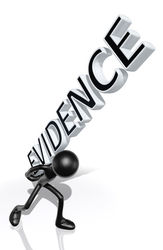
Compliance Law, like Regulatory Law, of which it is an extension, is an Ex Ante Law.
It translates into a set of obligations that companies must perform to ensure that harmful behavior does not occur, such as bribery, money laundering, pollution, etc.
This results in "structural" obligations, such as the establishment of a risk map, a third-party vigilance system, internal controls, the adoption of codes.
The practical question that arises is whether to punish a company, it is necessary but it is sufficient that the company has not adopted these structural measures, or if it is also necessary that within it or through the persons whom it must be accountable (through the corporate officers and the employees, but also the suppliers, the sub-contractors, the financed operators, etc.) there were behaviors that Compliance Law prohibits, for example corruption, money laundering, pollution, safety-related accident, etc.
The question is probative. Its practical stake is considerable.
Because to obtain the conviction the prosecuting authority will have to demonstrate not only a failure in the structural device but also a behavioral failure.
Si l'on considère que le Droit de la Compliance est à la fois sur l'Ex Ante et sur l'Ex Post, alors l'autorité de poursuite qui requiert une sanction doit démontrer qu'il y a un comportement reprochable (Ex Post) et qu'à cela correspond une défaillance structurelle (par exemple le compte bancaire anormal n'a pas été signalé) ; si l'on considère que le Droit de la Compliance est purement en Ex Ante, alors même s'il n'y a pas de comportement reprochable en Ex Post, la seule défaillance structurelle suffit pour que l'entreprise qui doit l'organiser en son sein soit sanctionné.
If we consider that Compliance Law is both on the Ex Ante and the Ex Post, then the prosecuting authority that requires a sanction must show that there is a reprehensible behavior (Ex Post ) and that this corresponds to a structural failure (for example the abnormal bank account has not been reported); if we consider that Compliance Law is purely Ex Ante, then even if there is no reprehensible behavior in Ex Post, the only structural failure is enough for the company to be sanctioned, even if it does its best efforts, even if no prohibited behavior will have accured in Ex Post.
The second system, which is much more repressive and places a considerable burden on companies, even if there is no proven illicit behavior, is that of French Law, probably because of a tendency towards Ex Ante organization. ..
Mais il faut garder mesure. Et cette mesure est probatoire.
But we must keep measure. And this measure is probative.
This is what the Commission des Sanctions of the Agence Française Anticorruption -AFA (French Anti-Corruption Agency's Sanctions Committee) has just said, in its decision of 4 July 2019, SAS S. et Madame C.,(written in French) contradicting the position of its director, who acted as the prosecuting authority. This is yet another general proof of the autonomy of the Sanctions Committee vis-à-vis to the Administrative Authority of which it is a part, and in relation to its director, who nevertheless governs it. But, jurisdictional model obliges, he has here the status of prosecuting authority, is subject to the regime of this one and not to the regime of head of the entity. Demonstration of the "functional autonomy" of the sanctioning bodies within the administrative regulatory and compliance authorities.
Indeed, this important decision expresses with precision and reason the distribution of the "burden of the allegation" and the "burden of proof" on the prosecuting body and on the company pursued, as well as the role of presumption that the recommendations issued by the French Anti-corruption Authority can play.
Read the analysis below.
Aug. 7, 2019
Publications
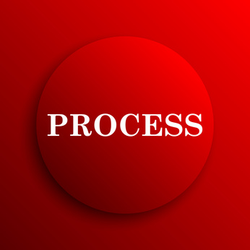
L'entreprise expose que les entreprises du secteur de l'énergie sont soumises à de très nombreuses exigences, dont la violation est très coûteuse aux opérateurs assujettis.
GE Digital, en tant qu'elle connaît la spécificité du secteur, l'énergie, et en tant qu'elle maîtrise les techniques digitales, a la solution : la Compliance par l'automatisation du respect de la réglementation spécifique régissant ce secteur-là.
Il s'agit explicitement "d'automatiser l'inspection, le contrôle et la négociation" pour écarter le "risque de compliance".
Est-ce vraiment ainsi qu'il faut concevoir la Compliance ?
____
Une conception automatique de la Compliance, conçue comme un "risque" pallié par un process aveugle
Oui, si l'on ne voit dans les règles applicables qu'un amas de "réglementation", dont on "risque" d'en manquer une, comme on manque une marche en descendant un immense escalier, sans fin, aux millions de marche, escalier sans début et sans fin.
C'est sans doute la façon dont beaucoup se représente la "réglementation" applicable à un secteur.
Dès lors, le risque ne serait pas dans le secteur, risque que le Droit a pour mission de diminuer en Ex Ante, en organisant par exemple la sécurité des personnes et en faisant en sorte que les accidents n'arrivent pas, que les blacks out ne se produisent pas ; non, comme le dit l'article, le risque serait dans la Compliance elle-même !
Le risque serait dans le fait de ne pas respecter ces process vides de sens et sans fin, auxquels l'on ne comprend rien car il n'y a rien à comprendre.
L'idée est donc de diminuer ce qui est expressément qualifié de "risque de compliance"....
Dans une vision totalement mécanique de la réglementation, la solution serait alors de mettre en place des machines : des algorithmes qui vont activer les corrélations entre les process suivis par l'entreprise et les normes réglementaires stockées dans la mémoire des ordinateurs. Comme tout cela est vide de sens, il n'est pas besoin d'êtres humains par exemple pour l'interprétation des injonctions : il suffit de "suivre".
Ainsi, les "regtechs" n'ont pas besoin de juriste pour lutter contre les "risques juridiques", puisque le sens des prescriptions n'est pas recherché.
Il suffirait alors effectivement qu'une entreprise du secteur ait la capacité technologique de stockage des textes et de corrélation entre ceux-ci et les process mis aveuglement en place par les entreprises, pour que la sécurité revienne.
Mais cette définition-là ne peut pas tenir.
La Compliance renvoie à un Droit, sujet à interprétation, qui doit être internalisé dans l'entreprise non seulement par des algorithmes mais encore et avant tout par des êtres humains, pour lesquels le Droit de la Compliance est fait.
L'entreprise expose que les entreprises du secteur de l'énergie sont soumises à de très nombreuses exigences, dont la violation est très coûteuse aux opérateurs assujettis.
GE Digital, en tant qu'elle connaît la spécificité du secteur, l'énergie, et en tant qu'elle maîtrise les techniques digitales, a la solution : la Compliance par l'automatisation du respect de la réglementation spécifique régissant ce secteur-là.
Il s'agit explicitement "d'automatiser l'inspection, le contrôle et la négociation" pour écarter le "risque de compliance".
Est-ce vraiment ainsi qu'il faut concevoir la Compliance ?
____
Une conception automatique de la Compliance, conçue comme un "risque" pallié par un process aveugle
Oui, si l'on ne voit dans les règles applicables qu'un amas de "réglementation", dont on "risque" d'en manquer une, comme on manque une marche en descendant un immense escalier, sans fin, aux millions de marche, escalier sans début et sans fin.
C'est sans doute la façon dont beaucoup se représente la "réglementation" applicable à un secteur.
Dès lors, le risque ne serait pas dans le secteur, risque que le Droit a pour mission de diminuer en Ex Ante, en organisant par exemple la sécurité des personnes et en faisant en sorte que les accidents n'arrivent pas, que les blacks out ne se produisent pas ; non, comme le dit l'article, le risque serait dans la Compliance elle-même !
Le risque serait dans le fait de ne pas respecter ces process vides de sens et sans fin, auxquels l'on ne comprend rien car il n'y a rien à comprendre. Il s'agirait d'appliquer à la règle les règles d'inspection et de contrôler, d'éliminer l'humain (toujours faillible) afin que par la suite plus rien ne soit reprochable à l'entreprise (car la machine est infaillible) :
"Leveraging GE Digital’s strong integration capabilities to Enterprise Asset Management (EAM) systems, APM Integrity’s Compliance Management uses data from an EAM to automatically generate an inspection plan based on the regulatory code that applies to the equipment. This streamlines the inspection planning process, allowing planners to take more of a review-and-approve role as opposed to a manual, planning-and-scheduling process. If a regulated piece of equipment does not have an inspection plan in place, users are automatically notified – providing a layer of protection that ensures inspections are not missed, which could result in a fine from regulators in the event of an audit".
L'idée est donc de diminuer ce qui est expressément qualifié de "risque de compliance"....: "GE Digital Launches New Capabilities to Automate Inspection Planning and Mitigate Compliance Risk".
Dans une vision totalement mécanique de la réglementation, la solution serait alors de mettre en place des machines : des algorithmes qui vont activer les corrélations entre les process suivis par l'entreprise et les normes réglementaires stockées dans la mémoire des ordinateurs. Comme tout cela est vide de sens, il n'est pas besoin d'êtres humains par exemple pour l'interprétation des injonctions : il suffit de "suivre".
Ainsi, les "regtechs" n'ont pas besoin de juriste pour lutter contre les "risques juridiques", puisque le sens des prescriptions n'est pas recherché.
Il suffirait alors effectivement qu'une entreprise du secteur ait la capacité technologique de stockage des textes et de corrélation entre ceux-ci et les process mis aveuglement en place par les entreprises, pour que la sécurité revienne.
Mais cette définition-là ne peut pas tenir.
Non que les machines soient inutiles ou néfastes, mais elles ne peuvent suffire. Or, elles sont parfois présentées en matière de Compliance comme constituant une solution compléte, permettant d'éliminer l'être humain, lequel était lui la source de tous les soucis.... Or, non seulement la définition mécanique de la Compliance ne peut pas tenir techniquement, mais par ce déplacement de l'humain vers la seule machine elle devient alors néfaste.
La Compliance renvoie à un Droit, sujet à interprétation, qui doit être internalisé dans l'entreprise non seulement par des algorithmes mais encore et avant tout par des êtres humains, pour lesquels le Droit de la Compliance est fait.
En effet, ce qui présentait comme une réglementation unique et plane est en réalité un système juridique hiérarchisé, dont le sens évolue et interagit. Ainsi et par exemple une norme constitutionnelle de Compliance, par exemple l'indépendance, l'impartialité, la loyauté, qui convergent dans la gestion des conflits d'intérêts - pan conséquent de la Compliance -, n'ont pas la même portée que les textes qui portent sur la même question mais ont des décrets, voire du "droit souple".
En outre, la lettre d'un texte permet de connaître son sens. Mais c'est aussi sa finalité et son contexte qui lui donnent son sens. La Cour de justice de l'Union européenne, Cour dont les arrêts sont décisifs en matière de Compliance, le rappelle régulièrement. Cela, une machine ne peut pas le "savoir", puisqu'un objet ne sait rien, pas plus que la suite de chiffres qu'est l'algorithme.
Enfin, le Droit de la Compliance peut se définir comme la nouvelle branche du Droit qui intègre dans des entreprises, par exemple celle du secteur énergétique, des finalités et des valeurs qui portent sur l'humanité et son futur, par exemple l'environnement. C'est avant tout dans les êtres humains qui constituent les entreprises concernées qu'il faut le faire comprendre.
Car le Droit est fait pour les êtres humains ; ce ne sont pas les êtres humains qui sont faits pour suivre ce que dicteraient les machines, comme le disait Portalis.
Mécaniser les humains, ce que produirait une vision si mécanique de la Compliance irait à l'encontre de toutes les nouvelles conception de ce qu'est l'entreprise, exprimait par la loi PACTE du 22 mai 2019.
Aug. 5, 2019
Publications

Digital technology is not only a new world: it has transformed the world (see a demonstration in this sense, Frison-Roche, MA, The contribution of Compliance Law in Internet governance, report to the French Government, July 2019 ) ..
Thus, one should not always put in the same basket even if the expression is euphonic "GAFAM". While some companies offer only intangible services, such as Facebook or Google, namely putting in contact, others have material activities. Amazon ensures the delivery of material objects, of which it provides storage for example, while Uber takes care of the transport of people. Admittedly, this company denies this meeting and ensures that it deals only with the connection, but Law has requalified its activity, which is indeed of a material nature.
It is therefore difficult to find a unity in these companies, apart from the fact that they are American, that their power seems as sudden as it is unmatched, their global deployment and that they appear "indispensable" to billions of individuals. .
Because many sellers consider that they can only reach potential buyers digitally, that the main market maker is Amazon, that the latter has enacted terms of sale that deprive these sellers numerous protections, the Germain Competition Authority, the Bundeskartellamt, opened on November 28, 2018 an abuse of a dominant position against Amazon.
The act taken by the Bundeskartellamt on July 17, 2019 with regard to Amazon and with the "Amazon agreement", in exchange for which the procedure initiated for a possible sanction of a possible abuse of a dominant position has stopped .
Ex Post competition law is exchanged for a Compliance program that goes beyond the powers of a competition authority and the territorial scope of the latter. This does not pose a problem, since it is the “acceptance” that the company makes of it that gives rise to the binding effect and no longer the law which mandated the Competition Authority.
This is an example of the remarkable transformation of Competition Law, which goes far beyond the digital issue. In 6 months, the lawsuit turns into an agreement. Which appears as a diktat of the Authority, bearing on the future, obliging in particular a different procedural behavior.
Read the analysis below.
July 30, 2019
Publications

L'Europe est décidément la zone du monde dans laquelle la protection des personnes se pense.
Elle le fait par des textes, dont le très fameux Réglement adopté en 2016 relative à la protection des personnes physiques à l'égard du traitement à caractère personnel et à la libre circulation de ces données, dit "RGPD", recopié désormais en Californie, par des initiatives nationales, comme la prochaine loi française contre les discours de haine dans l'espace numérique, par de nombreuses études et rapports - le droit souple étant aussi importante que le Droit pénal en Droit de la Compliance, mais encore par des décisions de justice.
Les décisions de justice ont été à l'origine du mouvement de protection de la protection, par la création prétorienne d'un "droit à l'oubli" par la décision Google Spain de 2014 de la Cour de Justice de l'Union européenne.
L'arrêt que la CJUE a rendu le 29 juillet 2019, Fashion ID, est tout aussi important. Comme le précédent, il tranche nettement une question essentielle : qui doit faire la police des consentements dans l'espace numérique.
Et la réponse est : tous les acteurs numériques qui en tirent profit.
Il en résulte donc un "intermaillage" (sur cette notion qui est l'avenir du Droit de la Compliance dans le numérique, v. Frison-Roche, M.-A., L'apport du Droit de la Compliance dans Internet, 2019).
Voir ci-dessous l'analyse de l'arrêt.

July 22, 2019
Publications

This working document serves as a basis for a contribution to the Grands Arrêts de la Propriété intellectuelle (major cases in Intellectual Property), published under the direction of Michel Vivant, in the new section devoted to Regulatory perspective.
Conceived as a "regulatory tool", intellectual property is then used by the State as an "incentive for innovation". Public authorities adopt solutions that stem from sectoral concerns that permeate intellectual property. Because the economic sectors become prime, the systemic perspective then prevails in the solutions retained in the judgments passed by the courts.
One can see it through three French court decisions:
► Civ., 1ière, 28 février 2006, named Mulholland Drive ;
► Paris, 11 décembre 2012, Sanofi-Aventis ;
► Civ., 1ière, 6 juillet 2017, SFR, Orange, Free, Bouygues télécom et autres.
Summary:
Intellectual property, derived from the State and inserted in a public policy, can be conceived, not to reward a posteriori the creator but to incite others to innovate. It is then an Ex Ante tool of Regulation, alternative to subsidies. If private copying is an exception, it is not in relation to the principle of competition but in an insertion in a system of incentives, starting from the costs borne by the author of the first innovation: the owner of the rights is then protected , not only according to a balance of interests, but in order not to discourage innovative potentials and the sector itself. (1st decision).
The sectoral policy then pervades the intellectual property used to regulate a sector, for example that of the drug. While it is true that a laboratory wishing to market a generic medicine did not wait for the patent expiry of the original medicine to do so, it is not relevant to sanction this anticipation of a few days because investments made by the holder of the intellectual property right have been made profitable by it and because the public authorities favor generics for the sake of public health (2nd decision).
The systemic interest provides and that is why Internet service providers have to bear the costs of access blocking while they are irresponsible because of the texts. This obligation to pay is internalized by Compliance because they are in the digital system best able to put an end to the violation of intellectual property rights that the ecosystem requires to be effective. (3rd decision).
It is necessary to underline the paradox represented by the infatuation of the theoreticians of Regulation with intellectual property, whose legal nature it transforms by an exogenous reasoning(I). Influenced, the case law uses reasoning based on incentives, investments, returns and costs, so that the State obtains the operators expected behaviors (II). As a natural result, there is a sectoral segmentation, for example in telecommunications or pharmacy, which ends up calling into question the uniqueness of intellectual property, according to the technologies and public policies that affect them (III). There are still imputations of new obligations on operators just because they are in the technical position of implementing intellectual property rights: the transition from Regulation to Compliance is thus taking place (IV).
July 15, 2019
Publications
July 15, 2019
Publications

Updated: July 4, 2019 (Initial publication: April 30, 2019)
Publications

► Complete reference : Frison-Roche, M.-A., Having a good behavior in the digital space, working paper, April 2019.
____
Summary: The jurist sees the world through the way he learns to speak
The Law of the Environment has already come to blur this distinction, so finally so strange because this classical conception refers to a person taken firstly in his immobility (Law of individuals), and then in his only actions (Contrats and Tort Law, Property Law). Indeed, the very notion of "environment" implies that the person is not isolated, that he/she is "surrounded", that he/she is what he/she is and will become because of what surrounds him/her ; in return the world is permanently affected by his/her personal action. On second thought, when once "Law of Individuals" was not distinguished from Family Law, the human being was more fully restored by this division in the legal system that not only followed him/her from birth to death but also in him/her most valuable interactions: parents, siblings, couples, children. Thus Family Law was finer and more faithful to what is the life of a human being.
To have instituted Law of Individuals, it is thus to have promoted of the human being a vision certainly more concrete, because it is above all of their identity and their body about what Law speaks, astonishing that we have not noticed before that women are not men like the others. To have instituted the Law of the people, it is thus to have promoted of the human being a vision certainly more concrete, because it is above all of his identity and his body that one speaks to us, astonishing that the we have not noticed before that women are not men like the others
From this concrete vision, we have all the benefits but Law, much more than in the eighteenth century, perceives the human being as an isolated subject, whose corporeality ceases to be veiled by Law
This freedom will come into conflict with the need for order, expressed by society, social contract, state, law, which imposes limits on freedom of one to preserve freedom of the other, as recalled by the French Déclaration des Droits de l'Homme of 1789. Thus, it is not possible de jure to transform every desire in action,, even though the means would be within reach of the person in question, because certain behaviors are prohibited in that they would cause too much disorder and if they are nevertheless committed, they are punished for order to return. Thus, what could be called "law of behavior", obligations to do and not to be put in criminal, civil and administrative Law, national and international Law, substantial Law and procedural Law :they will protect the human being in movment pushed by the principle of freedom forward others and thing, movement inherent in their status as a Person.
The human being is therefore limited in what they want to do. In the first place by the fact: their exhausting forces, their death that will come, the time counted, the money that is lacking, the knowledge that they does not even know not holding, all that is to say by their very humanity; Secondly, by the Law which forbids so many actions ...: not to kill, not to steal, not to take the spouse of others, not to pass as true what is false, etc. For the human being on the move, full of life and projects, Law has always had a "rabat-joy" side. It is for that reason often ridiculous and criticized because of all its restraining regulations, even hated or feared in that it would prevent to live according to our desire, which is always my "good pleasure", good since it is mine. Isolated and all-powerful, the human being alone not wanting to consider other than its desire alone.
Psychoanalysis, however, has shown that Law, in that it sets limits, assigns to the human being a place and a way of being held with respect to things and other persons. If one no longer stands themselves by the prohibition of the satisfaction of all desire (the first of which is the death of the other), social life is no longer possible
But this presentation aims to make it possible to admit that the criterion of Law would be in the effectiveness of a sanction by the public power: the fine, the prison, the confiscation of a good, which the rudeness does not trigger whereas Law would imply it: by this way we are thus persuaded of the intimacy between the public power (the State) and Law... But later, after this first lesson learned, the doubt comes from the consubstansuality between Law and State. Is it not rather appropriate to consider that Law is what must lead everyone to "behave well" with regard to things and people around them? The question of punishment is important, but it is second, it is not the very definition of Law. The French author Carbonnier pointed out that the gendarme's "kepi" is the "Law sign", that is to say what it is recognized without hesitation, but it is not its definition.
The first issue dealt with by Law is then not so much the freedom of the person as the presence of others. How to use one's freedom and the associated deployment of forces in the presence of others? How could I not using it when I would like to harm them, or if the nuisance created for them by the use of my free strength is indifferent to me
We do not use our force against others because we have interest or desire, we do not give him the support of our strength while he indifferent us, because Law holds us. If the superego was not enough. If Law and the "parental function of the States" did not make alliance. We do it because we hold ourselves
Or rather we were holding ourselves.
Because today a new world has appeared: the digital world that allows everyone not to "hold" himself, that is to say to constantly abuse others, never to take them into consideration, to attack massively. It's a new experience. It is not a pathological phenomenon, as is delinquency (which simply leads to punishment), nor a structural failure in a principle otherwise admitted (which leads to regulatory remedies) but rather a new use, which would be a new rule: in the digital space, one can do anything to everyone, one is not held by anything or anyone, one can "let go" (I). This lack of "good behavior" is incompatible with the idea of Law, in that Law is made for human beings and protect those who can not afford to protect themselves; that is why this general situation must be remedied (II).
Cornu, G., Linguistique juridique, 2005.
Frison-Roche, M.-A. & Sève, R., Le Droit au féminin (ed.), 2003.
Under this "mask" of the "subject of Law", we are all equal. S. Archives de Philosophie du Droit, Le sujet de droit, 1989.
Baud, J.P., L'affaire de la main volée. Histoire juridique du corps humain, 1993.
On neurosis as a constitutive mode of child sociability, s. Lebovici, S., "C'est pas juste", in La justice. L'obligation impossible, 1994.
Read the article of Alain Supiot about the idée of Rule common of all, under the discussion between all, presented by this author through the artwork of Kafka : "Kafka, artiste de la loi", 2019; Kafka is very present in the work of Alain Supiot, for example in his First Lesson in the Collège de France, 2012, or in an Introduction of La Gouvernance par les nombres ; This latter book is now available in English : Governance by numbers. The making a legal model of allegiance, 2017 (translated by S. Brown).
That's why splitting Persons Law and Family Law masks another reality: the family is not made up of third parties. The links are there. They pre-exist. Starting from the only Persons Law pushes to think one can "build" his/her family by links drawn on white paper: the contracting of the families made up of individuals becomes thinkable, even natural.
June 28, 2019
Publications

It is often observed, even theorized, even advised and touted, that Compliance is a mechanism by which public authorities internalize political (eg environmental) concerns in big companies, which accept them, in Ex Ante, because they are rather in agreement with these "monumental goals" (eg saving the planet) and that this shared virtue is beneficial to their reputation. It is observed that this could be the most successful way in new configurations, such as digital.
But, and the Compliance Mechanism has often been brought closer to the contractual mechanism, this is only relevant if both parties are willing to do so. This is technically true, for example for the Deferred Prosecution, which requires explicit consent. This is true in a more general sense that the company wants to choose itself how to structure its organization to achieve the goals politically pursued by the State. Conversely, the compliance mechanisms work if the State is willing to admit the economic logic of the global private players and / or, if there are possible breaches, not to pursue its investigations and close the file it has opened, at a price more or less high.
But just say No.
As in contractual matters, the first freedom is negative and depends on the ability to say No.
The State can do it. But the company can do it too.
And Daimler just said No.
___
Publicly, including through an article in the Wall Street Journal of June 28, 2019.
The company sets out in a warning to the market that it is the object of a requirement on the part of the German Motor Authority (Kraftfahrt-Bundesamt) of an allegation of fraud, by the installation of a software, aimed at misleading instruments for measuring emissions of greenhouse gases on cars using diesel.
It is therefore an environmental compliance mechanism that would have been intentionally countered.
On this allegation, the Regulator both warns the company of what it considers to be a fact, ie compliance fraud, and attaches it to an immediate measure, namely the removal of the circulation of 42,000 vehicles sold or proposed by Daimler with such a device.
And the firm answers : "No".
_____
Which is probably only beginning, since a No ends the dialogue of Ex Ante to project in the Ex Post sanction procedures, calls 6 observations:
- 1. No doubt Daimler, a German car manufacturing company, has it in mind in this allegation of fraud calculating pollution of its diesel cars what happened to his competitor Volkswagen: namely a multi-billion dollar fine, for lack of compliance in a similar hypothesis (so-called dieselgate). The strategic choice that is then made depends on education through the experience of the company, which benefits as such from a previous case that has had a very significant cost. Thus educated, the question is to measure the risk taken to refuse any cooperation, when the company can anticipate that it will still result in such an amount ....
- 2. In addition, we find the difficulty of the distinction of Ex Ante and Ex Post. Indeed, saying No will involve for the company a cost of confrontation with the Regulator, then the peripheral jurisdictions or review courts. But in Germany, the Government itself, concerning a bank threatened with compliance proceedings and almost summoned by the US regulator to pay "of its own free will" a transactional fine, felt that this was not normal, because it must be the judges who punish, after a contradictory procedure with due process and after established facts.
- 3. However, this is only an allegation, of probable assertions, of what legally allows to continue, but which does not allow to condemn. The confusion between the burden of proof, which presupposes the obligation to prove the facts before being able to sanction, and the burden of the allegation, which only supposes to articulate plausibility before being able to prosecute, is very damaging, particularly if we are committed to the principles of Repressive Law, such as the presumption of innocence and the due process. This distinction between these two probationary charges is at the heart of the probatory system in the Compliance Law. Because Compliance Law always looks for more efficiency, tends to go from the first to the second, to give the Regulator more power, since businesses are so powerful ....
- 4. But the first question then arises: what is the nature no so much of the future measure to be feared, namely a sanction that could be taken later, against Daimler, if the breach is proven, or which will not be applied to the firm if the breach is not established; but what is the nature of the measure immediately taken, namely the return of 42,000 vehicles?
- This may seem like an Ex Ante measurement. Indeed, the Compliance assumes non-polluting cars. The Regulator may have indications that these cars are polluting and that the manufacturer has not made the necessary arrangements for them to be less polluting (Compliance) or even organized so that this failure is not detected ( Compliance fraud).
- This allegation suggests that there is a risk that thiese cars will polluting. They must immediately be removed from circulation for the quality of the environment. Here and now. The question of sanctions will arise after that, having its procedural apparatus of guarantees for the company that will be pursued. But see the situation on the side of the company: having to withdraw 42,000 vehicles from the market is a great damage and what is often called in Repressive Law a "security measure" taken while the evidence is not yet met could deserve a requalification in sanction. Jurisprudence is both abundant and nuanced on this issue of qualification.
- 5. So to withdraw these cars, it is for the company to admit that it is guilty, to increase itself the punishment. And if at this game, taken from the "cost-benefit", as much for the company immediately assert to the market that this requirement of Regulation is unfounded in Law, that the alleged facts are not exacts, and that all this the judges will decide. It is sure at all whether these statements by the company are true or false, but before a Tribunal no one thinks they are true prima facie, they are only allegations.
- And before a Court, a Regulator appears to have to bear a burden of proof in so far as he has to defend the order he has issued, to prove the breach which he asserts exists, which justifies the exercise he made of his powers. The fact that he exercises his power for the general interest and impartially does not diminish this burden of proof.
- 6. By saying "No", Daimler wants to recover this classic Law, often set aside by Compliance Law, classic Law based on burden of proof, means of proof, and prohibition of punitive measures - except imminent and future imminente and very serious damages - before 'behavior could be sanctioned following a sanction procedure.
- Admittedly, one would be tempted to make an analogy with the current situation of Boeing whose aircraft are grounded by the Regulator in that he considers that they do not meet the conditions of safety, which the aircraft manufacturer denies , Ex Ante measurement that resembles the retraction measure of the market that constitutes the recall request of cars here operated.
- But the analogy does not work on two points. Firstly, flight activity is a regulated activity that can only be exercised with the Ex Ante authorization of several Regulators, which is not the case for offering to sell cars or to drive with. This is where Regulatory Law and Compliance Law, which often come together, here stand out.Secundly, the very possibility that planes of which it is not excluded that they are not sure is enough, as a precaution, to prohibit their shift. Here (about the cars and the measure of the pollution by them), it is not the safety of the person that is at stake, and probably not even the overall goal of the environment, but the fraud with respect to the obligation to obey Compliance. Why force the withdrawal of 42,000 vehicles? If not to punish? In an exemplary way, to remind in advance and all that it costs not to obey the Compliance? And there, the company says: "I want a judge".
______
June 24, 2019
Publications

In what it presents as a set of guidelines designed by a risk-driven approach, the FATF published on 21 June 2019 recommendating to fight the use of crypto-assets and cryptocurrency platforms for launderind money and financing terrorism.
This fight against money laundering is (with the fight against corruption) often presented as the core of the Compliance Law. The FATF takes a large part of it. Even if this new branch of Law aims to crystallize other ambitions, such as the fight against tax fraud or climate change, or even the promotion of diversity or education and the preservation of democratie, the legislation of Compliance Law are mature in the matter of money laundering and the terrorism financing, as they are in the fight against corruption.
The news comes then not from the new legal mechanisms but rather from the new technological tools that could allow the realization of the behaviors against which these obligations of compliance have been inserted in the legal system. It is then to these technologies that the law must adapt. This is the case with crypto-assets and cryptocurrency platforms. Because these are rapidly evolving technologies, with the exercise of written guidelines in 2019 to inform the meaning of the provisions adopted in 2018, the FATF is taking the opportunity to change the definition it provides of crypto-assets and cryptocurrencies. So that a too narrow definition by the texts does not allow the operators to escape the supervision (phenomenon of "hole in the racket" - loophole)..
___
In fact, in October 2018, the FATC (Financial Action Task Force) developed 15 principles applying to these platforms, to allow this intergovernmental organization to carry out its general mission to combat money laundering and the financing of terrorism. These June 2019 recommendations are to interpret them.
In this very important document, where it is expressly stated that it is a matter of fixing the obligations of those who propose crypto-assets and crypto-currencies, the notion of self-regulation is rejected. Il est writter : "Regarding VASP (virtual assets services providers) supervision, the Guidance makes clear that only competent authorities can act as VASP supervisory or monitoring bodies
On the contrary, it is a matter of elaborating the control obligations that these service providers must exercise over products and their customers (Due Diligences), which must be supervised by public authorities.
In order to exercise this supervision and monitoring, the national authorities themselves must ensure that they work together : "As the Virtual Assets Services Providers (VASP) sector evolves, countries should consider examining the relationship between AML/CF (Anti-Money Laundering and Counter Terrorist Financint) measures for covered VA activities and other regulatory and supervisory measures (e.g., consumer protection, prudential safety and soundness, network IT security, tax, etc.), as the measures taken in other fields may affect the ML/TF risks. In this regard, countries should consider undertaking short- and longer-term policy work to develop comprehensive regulatory and supervisory frameworks for covered VA activities and VASPs (as well as other obliged entities operating in the VA space) as widespread adoption of VAs continues".
After particularly interesting comparative law information on Italy, the Scandinavian countries and the United States, the report concludes: "International Co-operation is Key", because of the global nature of this activity.
Since the issue is not the global Regulation of these platforms and types of products, but only the possible modes of money laundering and terrorist financing to which they may give rise, the FATF recalls that neither crypto-products nor product suppliers are not referred to as such. As the guidance's title recalls, common to the 2018 document adopting the 15 principles and this interpretive document, these are "risk-based" rules. Thus, it is according to the situations that these - products and suppliers - that they may or may not present risks of laundering and financing of terrorism: depending on the type of transaction, the type of client, the type of country, etc. For example, from the moment that the transaction is anonymous, that is impossible to know the "beneficiary", or that it is transnational and instantaneous, which makes it difficult to supervise because of the heterogeneity of national supervisions little articulated between them.
In reports that public supervisors must have with crypto-product suppliers, they must adjust according to the level of risk presented by them, higher or lower: "Adjusting the type of AML/CFT supervision or monitoring: supervisors should employ both offsite and onsite access to all relevant risk and compliance information.However, to the extent permitted by their regime, supervisors can determine the correct mix of offsite and onsite supervision or monitoring of Virtual Assets Services Providers (VASPs). Offsite supervision alone may not be appropriate in higher risk situations. However, where supervisory findings in previous examinations (either offsite or onsite) suggest a low risk for ML/TF, resources can be allocated to focus on higher risk VASPs. In that case, lower risk VASPs could be supervised offsite, for example through transaction analysis and questionnaires".
This "adjustment" required does not prevent a very broad conception of the power of supervision. So, for nothing escapes the recommendations (and in particular the obligations that ensue for the suppliers of these products), the definition of the crypo-assets and crypo-currencies is this one: “Virtual asset” as a digital representation of value that can be digitally traded or transferred and can be used for payment or investment purposes. Virtual assets do not include digital representations of fiat currencies, securities, and other financial assets that are already covered elsewhere in the FATF Recommendations."
And for the same reason of effectiveness is posited the principle of technological neutrality: "Whether a natural or legal person engaged in Virtual Assets (VA) activities is a Virtual Asset Services Provider (VASP) depends on how the person uses the VA and for whose benefit. As emphasized above, ... then they are a VASP, regardless of what technology they use to conduct the covered VA activities. Moreover, they are a VASP, whether they use a decentralized or centralized platform, smart contract, or some other mechanism.".
The interpretative guidelines then formulate the obligations that these platforms have with regard to the supervisors they obey(question of the "jurisdiction", ratione loci ; ratione materiae): " The Guidance explains how these obligations should be fulfilled in a VA context and provides clarifications regarding the specific requirements applicable regarding the USD/EUR 1 000 threshold for virtual assets occasional transactions, above which VASPs must conduct customer due diligence (Recommendation 10); and the obligation to obtain, hold, and transmit required originator and beneficiary information, immediately and securely, when conducting VA transfers (Recommendation 16). As the guidance makes clear, relevant authorities should co-ordinate to ensure this can be done in a way that is compatible with national data protection and privacy rules. ".
These platforms are not uniformly defined due to the diversity of their activities. Because it is their activity that makes them responsible for this or that regulator. For example from the Central Bank or the Financial Regulator: "For example, a number of online platforms that provide a mechanism for trading assets, including VAs offered and sold in ICOs, may meet the definition of an exchange and/or a security-related entity dealing in VAs that are “securities” under various jurisdictions’ national legal frameworks. Other jurisdictions may have a different approach which may include payment tokens. The relevant competent authorities in jurisdictions should therefore strive to apply a functional approach that takes into account the relevant facts and circumstances of the platform, assets, and activity involved, among other factors, in determining whether the entity meets the definition of an “exchange”
____
Reading this very important document, it is possible to make 6 observations:
1. Interpretative documents are often more important than rules interpretated themselves. En these guidances, first and foremost, these are major obligations that are stated, not only for platforms but also for national laws, and well beyond the issue of money laundering. So, it is laid: "Countries should designate one or more authorities that have responsibility for licensing and/or registering VASPs. ... at a minimum, VASPs should be required to be licensed or registered in the jurisdiction(s) where they are created. ".This is a general prescription, involving a general regulation of these platform, which registered in a general way, will probably be supervised in a general way.
Secondly, it is a series of binding measures that is required of the National legal systems, for example the possibility of seizing crypto-values.
It shows that the soft Law illustrates the continuum of the texts, and allows their evolution. Here the evolution of the definition of the object itself: the definition of crypto-assets and crypto-currencies is widened, so that the techniques of money laundering and terrorist financing are always countered, without it being necessary to adopt new binding rules. We are beyond mere interpretation. And even more of the principle of restrictive interpretation, classically attached to the Repressive Law ...
2. Fort the effectiveness of the Compliance Law, definition become extremely broad. Thus, to follow the FATF, the definititon off a financial institution is as follows: "“Financial institution” as any natural or legal person who conducts as a business one or more of several specified activities or operations for or on behalf of a customer". This is more the definition of a company in Competition Law
3. In the same way, the definition of crypto-assets or crypto-currencies: "“Virtual asset” as a digital representation of value that can be digitally traded or transferred and can be used for payment or investment purposes. Virtual assets do not include digital representations of fiat currencies, securities, and other financial assets that are already covered elsewhere in the FATF Recommendations". This definition is purely operational because nothing can escape the FATF: all that is financial or monetary, whatever its form or support, its traditional form or a form that will be invented tomorrow, is within its competence and, through a such definition, is under national supervisors. In Compliance Law, and since everything is based on risk analysis, the idea is simple: nothing must escape obligations and supervision.
4. Platform apprehension is done by the criterion of activity, according to the "functional" method. Thus, its supervision, or even its regulation, and its obligations of compliance, will apply, depending on what it does, to the Financial Regulator (if it does ICO) or to others if it only uses tokens as an instrument of exchange. If it makes several uses, then it would fall under several Regulators (criterion ratione materiae).
5. The principle of "technological neutrality" is a classic principle in Telecommunications Law. Here we measure the interference between the principles of Telecommunications Law and Financial Law, which is logical because crypto-financial objects are born of digital technology. This neutrality allows both technological innovation to develop and supervision to be unhindered for not having foreseen an innovative technology appearing after the adoption of the legal text. Here again, the effectiveness of Compliance and risk management are served, without the innovation being thwarted, which is often opposed.
6. What is expected of national public authorities is a very wide "interregulation". This is both "positive". Indeed, this includes financial matters but also the security of networks, or the protection of consumers. It can be called equilibrium interregulation in that all goals converge. But this is also an "interregulation" that can be described as balance. Indeed, the FATF is concerned about the protection of personal data. However, it emphasizes that the effectiveness of the Compliance system must stop. But the protection of personal data is also a part of Compliance Law.... This is one of the major challenges in the future: the balance between security and the fight against global evils(here the fight against money laundering and terrorism) and the protection of the privacy of individuals, as both fall under Compliance, but both have opposite legal effects: one the transmission of information, and the other the secret of the information.
____
souligné par nous
Underlined by us.
Plus loin, le texte donne une définition plus détaillée : "When determining whether a specific activity or entity falls within the scope of the definition and is therefore subject to regulation, countries should consider the wide range of various VA services or business models that exist in the VA ecosystem and, in particular, consider their functionality or the financial activities that they facilitate in the context of the covered VA activities (i.e., items (i) through (v) described in the VASP definition above). Further, countries should consider whether the activities involve a natural or legal person that conducts as a business the five functional activities described for or on behalf of another natural or legal person, both of which are essential elements to the definition and the latter of which implies a certain level of “custody” or “control” of the virtual asset, or “ability to actively facilitate the financial activity” on the part of the natural or legal person that conducts the business for a customer."
June 20, 2019
Publications
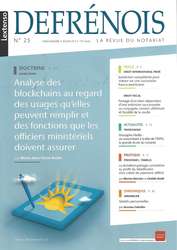
Référence complète : Frison-Roche, M.-A., Analyse des blockchains au regard des usages qu'elles peuvent remplir et des fonctions que les officiers ministériels doivent assurer, in Revue Défrenois, Lextenso, n°25, 20 juin 2019, pp. 23-29.
Résumé : La blockchain est une technologie qui n'est pas, en soir, bonne ou mauvaise. Elle est plus ou moins adaptée aux fonctions qu'elle est apte à remplir. Ce qu'il faut ensuite confronter aux fonctions que l'État a dévolues aux officiers ministériels. Or, autant les fonctions de conservation et de duplication des actes gagnent à être transférées et développées dans cette technologie, autant la fonction d'élaboration des instrumentums ne peut être assumée que par des officiers ministériels auxquels l'État demande de vérifier la correspondance entre les mentions des instrumentums et la réalité des négotiums, ce que seuls des êtres humains peuvent mener et ce qu'aucune machine ne peut faire.
May 29, 2019
Publications
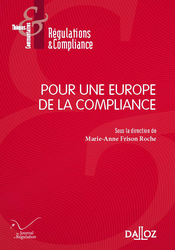
► Full Reference: M.-A. Frison-Roche, "Avant-propos" ("Foreword"), in M.-A. Frison-Roche (ed.), Pour une Europe de la Compliance (For the Europe of Compliance), series "Régulations & Compliance", 2019.
____
📕read a general presentation of the book, Pour une Europe de la Compliance, in which this foreword is published.
____
► The Foreword: It is sometimes said the construction of Europe is blocked, or even is in decline. But this construction can only advance because it is not only community to be rediscovered by the effect of a common culture or the result of an agreement between States or the benefit of commercial exchanges: it is also a legal Order. And Law is moving forward, sometimes like a goat through rulings of lightning justice, sometimes through legislation whose development have certainly the step of the turtle but also the strength of this military figure.
For this, any legal mechanism is good to take, so foreign, even aggressive, it may seem at first. Compliance, on which everyone questions the definition, in which we sometimes see the enemy to fight, about which we often doubt that it is really a legal mechanism, could well be useful.
So, let's seize the opportunity. It is not so common that a branch of law appears. The framework is still young, it is appropriate to take advantage of what is sometimes presented as defects, for example the uncertainty of definitions, but which are only defects of youth, or what is perceived as archaisms, in particular the violence of the compliance mechanisms, in their scale, their procedure and their territorial scope. But isn't a means of reconstituting the regalian at the moment when the states are struggling to recover from a report given to the cause to the territory ? Allowing them to pursue goals in the pretension that they must be satisfied (for example the fight against corruption or the sale of human beings)? Compliance Law allows the states to claim again and with a stronger voice their prerogatives.
Moreover, let us take advantage of this still malleable idea of the Compliance Law to obtain that Europe imbues the compliance mechanism with its legal Order. Compliance Law is undoubtedly the Law of tomorrow, the law without frontiers by which the legitimate public authorities set the Law, by fixing Ex ante goals and internalizing them in the crucial operators who carry them out in ways they build, public supervisors continuously monitoring the results achieved the goals set by the authorities. The Compliance Law allows that the powerful worldwird companies are not our masters because is the master who sets the goals and not the one who reaches them.
This is where Europe brings to the Compliance Law, where Europe can be exemplary of the Law of tomorrow. Indeed, where long-established systems, as American Law did, have developed Cmpliance techniques to prevent systemic risks, Europe can put back to the center its primary concern: the Person, a notion that Europe invented in order to protect by rights and obligations human beings against the only game of powers.
A Europe strengthened by Compliance Law; a Compliance Law transfigured by the European tradition: how not to be For a Europe of Compliance?
This is what the authors of this book demonstrate to us.
________
May 29, 2019
Publications

♾️ follow Marie-Anne Frison-Roche on LinkedIn
♾️ subscribe to the Newsletter MAFR Regulation, Compliance, Law
____
► Full Reference: M.-A. Frison-Roche (ed.), Pour une Europe de la Compliance (For the Europe of the Compliance), series "Régulations & Compliance", Dalloz, 2019, 124 p.
____
This volume is the continuation of the books dedicated to Compliance in this collection.
📚Read the other books' presentations of the collection about Compliance:
🕴️M.-A. Frison-Roche (ed.), 📕La juridictionnalisation de la Compliance, 2023
🕴️M.-A. Frison-Roche (ed.), 📕Les Buts Monumentaux de la Compliance, 2022
🕴️M.-A. Frison-Roche (ed.), 📕Les outils de la Compliance, 2021
🕴️N. Borga, 🕴️J.-Cl. Marin &🕴️J.-Ch. Roda (ed.), 📕Compliance : l'Entreprise, le Régulateur et le Juge, 2018
🕴️M.-A. Frison-Roche (ed.), 📕Régulation, Supervision, Compliance, 2017
🕴️M.-A. Frison-Roche (ed.),📕 Internet, espace d'interrégulation, 2016
📚Read the presentations of the other titles of the collection.
____
► General presentation of the book: This book is written in French. The topic is : "For the Europe of the Compliance".
See below its general presentation in English.
The political dimension is intrinsic to the Compliance Law. Indeed, compliance mechanisms consist of internalizing in certains companies the obligation to implement goals of general interest set by Public Authorities. These public bodies control the Ex Ante reorganization that implies for these companies and punish Ex Post the possible structural inadequacy of these compagnies, becoming transparent for this purpose.
This new mode of governance establishes a continuum between Regulation, Supervision, Compliance (book published in 2017) and renew the links between Companies, Regulators and Judges
This political dimension must be increased: the Compliance Law of Compliance must today be used to build Europe.
One can observe not only the construction of the European Compliance Law, object-by-object, sector-by-sector, purpose-by-purpose, but also the construction of the European Compliance Law that transcends and unifies them. Becoming independent of American Law and ceasing to be in reaction, even on the defensive, the Compliance Law contributes to the European project, offering it a higher ambition, that Europe can carry and, by this way, can carry the Europe itself, not only to preserve the European economy from corruption or money laundering, but by claiming the protection of nature and human beings.
This is why the book describes the "reasons and objectives" of the Europe of the Compliance, which makes it possible to describe, detect and even predict the ways and means.
____
► Understand the book through the Table of Contents and the summaries of each article:
🕴️M.-A. Frison-Roche, 📝Avant propos
🕴️K. Lenaerts, 📝Le juge de l'Union européenne dans une Europe de la compliance
🕴️M.-A. Frison-Roche, 📝Un droit substantiel de la compliance, appuyé sur la tradition européenne humaniste
I. LES RAISONS ET LES OBJECTIFS D'UNE EUROPE DE LA COMPLIANCE (THE REASONS AND OBJECTIVES OF THE EUROPE OF THE COMPLIANCE)
🕴️X. Musca, 📝Construire une Europe de la compliance en donnant une meilleure place aux entreprises
🕴️P. Vimont, 📝La place de la diplomatie dans l'avancée d'une Europe de la compliance
🕴️P. Sellal, 📝Les vertus de la compliance : une réponse possible aux faiblesses de l'Union européenne ?
🕴️J.-J. Daigre, 📝Compliance, entreprise et Europe
II. LES VOIES ET MOYENS D'UNE EUROPE DE LA COMPLIANCE (THE WAYS AND MEANS OF THE EUROPE OF THE COMPLIANCE)
🕴️J.-Cl. Marin, 📝Quels outils pour la construction du droit de la compliance en Europe ?
🕴️M. Canto-Sperber, 📝La compliance et les définitions traditionnelles de la vertu
🕴️T. Bonneau, 📝Compliance et secteur bancaire et financier en Europe
🕴️C. Duchaine, 📝L'Agence française anticorruption, à l'appui de l'Europe de la compliance
🕴️D. Martin, 📝Les contraintes et les vertus de la compliance
🕴️A. de La Cotardière, 📝Construire une Europe de la compliance lisible pour les entreprises
________
Frison-Roche, M.-A., Compliance, see
May 29, 2019
Publications
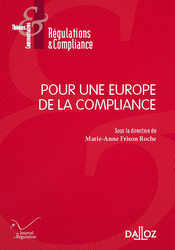
♾️ follow Marie-Anne Frison-Roche on LinkedIn
♾️ subscribe to the Newsletter MAFR Regulation, Compliance, Law
____
► Full Reference: M.-A. Frison-Roche, "Un Droit substantiel de la Compliance, appuyé sur la tradition européenne humaniste" ("A substantive Compliance Law, based on the European humanist tradition"), in M.-A. Frison-Roche (ed.), Pour une Europe de la Compliance, series "Régulations & Compliance", Dalloz, 2019, p. 13-35.
____
📝read the article (in French)
____
🚧read the bilingual Working Paper which is the basis of this article, with additional developments, technical references and hyperlinks
____
📕read a general presentation of the book, Pour une Europe de la Compliance, in which this article is published
____
► Summary of the article (done by the Journal of Regulation & Compliance): L'on présente souvent la Compliance comme un ensemble lourd, coûteux et incompréhensible de process, ensemble vide de sens, tandis que l'on ressent l'Europe comme un projet dont l'achèvement serait sans espoir ; alors mêler les deux ... Et pourtant ! Pour que Compliance et Europe s'adossent l'une à l'autre dans une construction commune, il faut tout d'abord que l'Europe cesse d'être "en défense" n'appréhendant la Compliance que d'une façon "réactive", ne mettant son talent au mieux que pour la recopier au pire que pour la rejeter (I). L'Europe a d'autant plus de mal à faire autre chose que le Droit de la Compliance étant le prolongement du Droit de la Régulation, c'est secteur par secteur, but particulier par but particulier que le Droit de la Compliance lui apparaît, la seule unité étant la forme, procédure Ex Ante des obligations structurelles ou procédure Ex Post des sanctions. Dans ce vide de sens d'une Compliance qui ne serait qu'une méthode et rien de plus, l'Europe n'est alors qu'un réceptacle récalcitrant....
Mais si l'on voit au-delà des secteurs, comme y invite le Droit européen des données désormais fortement constitué sur le Droit de la Compliance pour protéger les données sensibles sans méconnaître le principe de circulation des données, données sensibles dont les données personnelles ne sont qu'une variété, l'on mesure que la référence au secteur s'efface. Un Droit substantiel de la Compliance peut alors se construire au regard des impératifs européens qui ont toujours été la protection de la personne (II). Se détachant de la régulation sectorielle, il apparaît alors plusieurs buts de compliance, appelant plusieurs formes de contrainte et plusieurs portées des mécanismes de Compliance.
Si le but est la prévention de risque de catastrophes systémiques, comme le sont les défaillances bancaires, l'éclatement des bulles financières, la mise en circulation d'informations inexactes dévastatrices ou le développement de maladies contagieuses, alors le Droit de la Compliance doit se constituer sans frontière, le coeur en est la gestion des informations, leur recueil et leur transmission à ceux qui les manient au mieux au regard des risques car la protection du système global le requiert et l'Europe y prend sa part. Mais dans les autres cas, la protection de la personne ne requiert pas cela car elle ne croise pas l'hypothèse de contamination de système. Or, l'Europe a inventé la notion juridique de "personne", idée qui recouvre tout être humain, sa vie, sa liberté et ses secrets. L'action immédiate et la transparence n'y sont plus requises de la même façon. Il convient alors, comme l'a fait le Droit européen à propos des données, d'organiser à la fois la circulation et la garde des secrets, en déterminant celui qui est le mieux placé pour le faire.
Le Droit de la Compliance pose que c'est toujours l'entreprise qui est la mieux placée pour le faire, mais soit pour ne pas utiliser l'information, soit pour transmettre l'information suivant les buts du Droit de la Compliance, soit sans interférence de l'Etat soit sous la tutelle de l'Etat et c'est toujours l'Autorité publique qui formule les buts. Plus encore, l'Europe peut prétendre qu'un marché n'est un espace vivable que s'il met en son centre l'être humain, qui n'est pas qu'un outil, cette conception humaniste permettant d'exiger des autres le respect de normes à propos desquelles l'Europe est exemplaire à travers ses entreprises et peut prétendre l'exiger à propos des entreprises qui entrent sur son espace, soit directement, soit à travers leurs produits.
________

May 27, 2019
Publications

Ce document de travail sert de base à une conférence dans la Journée d'étude : "J'ai toujours été pour tout être". Guillaume Dustan ou l'infini des possibles", du 28 mai 2019.
Il est aussi référencé dans l'Emission qui lui est consacrée par France Culture le 15 février 2020.
__________
J'ai toujours été pour Tout Etre.
"Tout Etre", c'est un très bon plan. Personne ne l'a : ce plan est trop onéreux, trop aristocratique, trop dévastateur pour celui qui le conçoit et le déroule.
C'est pourtant ce qui fît William. Etre un homme accompli.
Le poser, le dire, le mener, suppose des qualités consubstantielles qui se cumulent, qui sont immédiatement acquises, visibles, constantes. Elles font se diriger toutes les flèches contre l'impudent. Depuis le départ et jusqu'à la fin. L'essentiel, la beauté, la prouesse d'un tel plan tiennent en ce qu'aucune de ces qualités ne se contredisent, ne s'affaiblissent les unes les autres, alors qu'on les met usuellement soit en choix exclusif soit en balance.
Que le corbeau, cher à Guillaume d'Occam, puisse être effectivement pleinement noir et encore être aussi pleinement blanc, en même temps, et pour autant n'en jamais devenir gris. Sinon la vie ne serait plus que grisaille, gribouillage et improvision. Il fallait que jamais la pureté du blanc ne vienne assombrir la pureté du noir. Tout noir et tout blanc, pleinement. Pour William faire différemment aurait été gâcher ses talents. Qui étaient si grands. Dès le départ, quand il était tout petit. Et jusqu'à la fin. Si douloureuse.
Cela fût un plan bien conçu, bien mené. Très réussi. Nous parlions souvent ensemble du dialogue de Platon, Le Philèbe , dans lequel celui-ci récuse le "mixte" pour louer la beauté du geste pur, du plaisir pur, ceux qui sont liés à l'inattendu et à la pureté de l'âme. Tout ce que les mécanismes d'intérêt, de calcul et d'opportunisme détruisent. Parce que William "a toujours été" du côté de la pureté, c'est-à-dire de l'absence de calcul, il ne pouvait y avoir de place pour le gris, ce mixte par exemple. L'âme de William était si pure.
Ainsi, Guillaume Dustan ne gâcha pas William Baranès. L'intensité de la couleur de l'un laissa intacte la pureté de la couleur de l'autre. Car " Tout Etre" demande avant tout de ne pas transiger, ni avec autrui ni avec soi.
Etre du côté du Tout, puisque William a "toujours été pour Tout Etre", cela ne laisse pas la place à grand chose, pas même pour la respiration. L'on comprend qu'à un moment le souffle lui ait manqué. Et là personne n'est venu puisque Tout Etre c'est prétendre se suffire.
Car qui réussit à " Tout Etre" ?
Cest-à-dire à Etre totalement Tout d'une façon substantiellement ontologique et contradictoire, si cela n'est le Christ ?
Celui-ci affirma être à la fois totalement Dieu et totalement homme. Il est vrai que ce personnage ne plût pas à tout le monde et qu'il fût crucifié à la grande joie de beaucoup et grâce à la souplesse du Tribunal dont il relevait de jure, l'eau étant disponible en abondance pour effacer toutes traces sur les mains de ceux qui auraient eu à perdre s'ils avaient exercé leurs responsabilités, le reste s'efffaçant dans l'indifférence .
"Tout Etre" c'est affronter dès le départ la perspective possible de cela. Avec la douleur par avance du spectacle non pas de ceux qui vous crucifient, non pas de ceux qui vous jettent des pierres sur le chemin, mais de tous ceux qui n'en ont rien à faire alors que l'ascèce de cette vie Totale fût conçue et menée pour eux. La dimension christique de la vie de William Baranès est tangible par cette complétude qu'il attînt en étant tout aussi pleinement Guillaume Dustan. Quand le calvaire commença pour cette personne entière, littérallement entière, personne ne bougea.
Un plan de cette ambition, Tout Etre, tout de suite et pour toujours l'on le retrouve chez Napoléon, qui fût lui aussi tout de suite Tout et qui ne trouva quelque repos qu'à Sainte-Hélène. Car il faut des îles pour contenir des personnages si grands : en les entourant d'eau, on peut tenter de les sauver d'eux-mêmes. D'ailleurs William partit dans des îles pour y exercer son office de juge.
Il pensait peut-être que l'eau pourrait éteindre le feu. Mais dans la maison qui brûlait, quand il fallut ne sauver qu'une chose, il fît comme répondît Cocteau : il ne sauva que le feu. Cocteau ne disait cela que pour faire de l'esprit, allant quant à lui de fête en fête, alors que William se consuma pour ne garder que le plus précieux des précieux pour qui ne veut que le Tout : garder la flamme. Comme une vestale. William était un classique.
_____
je ne saurais dire quelle place avait l'amitié et encore moins l'exercice du Droit pour Guillaume Dustan, mais je crois pouvoir dire celle qu'ils occupaient pour William.
Là encore, cela serait méconnaître qui était William de monter l'un contre l'autre, d'opposer l'ami et le juriste, comme si l'on devait décrire un personnage privé, celui qui fut l'ami par exemple, et un personnage public de la fonction publique, juge administratif, auteur d'écrits de Droit ou de réflexion sur le Droit.
En effet, lorsque nous discutions ensemble en soliloque partagé, le Droit avait une grande place. Nous n'étions qu'étudiants lorsque nous avons commencé à parler du Droit et de l'Injustice, ce qui nous permit plus tard, devenant plus grands en âge, de rédiger des écrits, de diriger des ouvrages et d'organiser des manifestations sur la Justice et sur le Droit.
Des descriptions de lui semblent présenter son "côté juriste" comme un élément annexe,ou paradoxal, ou un paravent, ou un pis-aller (il faut bien trouver une source de revenus...., être fonctionnaire....). C'est lui faire injure. Celui qui pose "Tout Etre" ne saurait perdre du temps avec des à-côtés, s'affaiblir avec des besognes sans intérêt ou sans rapport avec son plan. Dans son plan, la Justice et le Droit ont une grande place.
Prenons un autre auteur qui, avant que Guillaume Dustan ne l'exprime à son tour et à sa manière, avait réfléchi sur la façon dont la société broye les êtres humains, ce que l'on pourrait désigner comme l'injustice du monde, Kafka. Alain Supiot, professeur de droit, a montré dans sa leçon inaugurale au Collège de France en 2012 et dans un article paru récemment dans le Nouveau Magazine Littéraire sur "Kafka, artiste de la Loi", que Kafka était juriste pour une compagnie d'assurance, vérifiant la réalité des accidents du travail et que cela marqua profondément son oeuvre, que l'on dit romanesque. Il faut avoir étudié, dossier après dossier, les bras et les jambes brisés par les machines aveugles et qui ne s'arrêtent pas tandis que le sang coule et que le corps se révulse, pour écrire ensuite Le procès ou La colonie pénitentaire....
Pour William, cela fût la même démarche. A l'envers. Ayant vu enfant la famille et la société broyer les êtres humains innocents, il choisit de devenir juriste, de connaître le Droit, de parler du Droit et de le pratiquer. Non pas parce qu'il faut bien choisir un métier et que l'ENA mènerait à tout. Non. Parce que l'injustice qui fût pour lui comme un bain d'acide dans lequel il trempa, ce qui donne de l'acuité, puis vit chacun y couler, il décida de le décrire, et sans doute Guillaume le fît aussi totalement, mais il décida également de la combattre. Dans le Tout, il y a l'action.
Nous n'avons à nous résigner de rien. Surtout pas si nous sommes des personnes entières. L'injustice, on la repère par l'expérience. Comme le dit Ricoeur, l'injustice est un fait qui rend "perspicace" et nous évite de perdre des forces et du temps à chercher le point exact de ce qui pourrait être le "juste". Puis, nous devons le dire, car "dire l'injustice", c'est déjà faire quelque chose en faveur de celui qui en est victime (Arendt: dire, c'est déjà agir pour autrui). C'est pourquoi William fît de nombreux travaux de philosophie de la justice en tant que celle-ci est nouée par un souci pour autrui, constitue donc un lien avec celui-ci, c'est-à-dire constitue l'amitié (I).
Plus concrètement encore, William choisit d'être juge, non pas par dépit et mauvais classement de sortie à l'ENA du fait de notes de stage catastrophiques - il est vrai que faire des leçons de morale à ceux qui notent se paye -, mais parce qu'être juge représentait pour lui la concrétisation de la justice au bénéfice de tout un chacun (II).
Si William était juriste, et pleinement, c'était par amitié pour le genre humain, pour aider autrui, celui qui était plus mal loti que lui (III). Voilà le bénéfice d'une vision totale du monde : l'on trouve toujours encore plus malheureux que soi. Et William mena même l'exploit de trouver plus malheureux que lui : Autrui.

Updated: May 27, 2019 (Initial publication: May 13, 2019)
Publications

First of all, this working document was used as a support for an oral intervention done in French on the general topic. L'officier ministèriel est-il soluble dans la blockchain ? (Is the ministerial officer soluble in the blockchain?) at the "Club du Droit", which took place at the Conseil supérieur du Notariat on May 14, 2019, in Pars.
Consult the general presentation of the conference (in French).
Then it serves as a basis for an article to be published in the Revue Defrénois (in French).
______
Introduction & Summary.
The technical analysis of the confrontation between the tool that is the blockchain and the function that ensure these particular people who are the "ministerial officers"
For this, it is necessary to keep in mind this distinction so simple: the blockchain is a tool, a thing, a machine, an algorithm, a mechanical, mathematical power, while the ministerial officer is a human being.
This refers to the distinction that the Western legal system, whether Civil Law or Common Law, poses as summa divisio: the distinction between human beings and things. This first distinction is formulated so that we do not treat human beings as things, since they are legally qualified as "person"
For this essential distinction to remain effective, not only should we not imagine human beings as things (reduced to their bodies, for example, or reduced to mechanical acts of consumption
But technology represents more and more things with anthromophormi forms and reactions , through robots which "speak", "intelligent" machines, etc. The economic success of promoters of machines and other human-like robots, mechanical solutions presented as "intelligent", is based on forgetting the distinction between the person and things. It is certainly possible to erase this distinction from our system of thought. The difficulty is that it is the basis of Western Lawl
It is this background that is played in the practical questiond of insertion of blockchains and other technologies and the way in which the various professions must exercise their functions today. If these tools are consistent with these functions, or even improve them, professionals must welcome them without suspicion, or even participate directly in developing them. If these tools are not capable of fulfilling certain functions entrusted to these professionals, then these functions must not be inadvertently or maliciously inserted into a blockchain, whose capacity for preservation and reliability does not amount to anything, because a thing doesn't have any ability to think.
This is why we must start from the functions, by dinstinguising the technical function of conservation, duplication and elaboration of acts (I).
It seems that assuming the technical reliability of preservation and duplication acquired through the blockchain, as soon as there is a part of elaboration in the act, human intervention must step in because a machine is unfit to check the facts. Here we find the distinction between the retranscribed negotium, this retranscription never being mechanical, and the instrumentum itself, which, split from what gave rise to it, can be subjected to duplicative and conservation technologies. These technologies of conservation and duplication could be so efficient that the notions of original and copy could be questioned because of the reliability of the blockchain (II).
Thus the blockain is an effective technology on the instrumentum as documents divided from the negotium, but it can not guarantee the correspondence between the two ; it has only the reliability in the conservation, the availability and the duplication to infinity of the instrumentum, of what is extremely useful, and justifies that ministerial officers incorporate this technology. But the function of these are not limited to being agents of conservation and duplicators. We do not simply move from the copyist monk to the blockchain. The main and so precious function of the ministerial officers is to check the accuracy of the mentions of the instrumentum in relation to the reality of the negotium. This is so precious for a market economy to have this correspondance
This would be the choice of a very liquid and unsecured market (without intermediary, with the benefit of lower cost in Ex Ante and higher risk for the long term). In policy, the balance is always between security and liquidity, especillay in financial systemic policy. This was done by American Law, wich prefered low costs and high liquidity, especially for real estate loans, which were securitized by subprime mortgages. For the moment, this choice is not made in this sense by European Law, safety concern in the elaboration of the acts being preferred and the distinction between the human aptitude and the mechanical aptitude remaining. And we know that in the first system the reajustment takes the form of a general crisis, which reinjects the reality of the negotiums, lost in the instrumentums. What price are we ready to pay ?
Once this distinction is clearly made, because the elaboration of an acte mus be made bye the ministerial officer, human being invested by the State of the particular charge ensures the accuracy of the mentions of the act with the reality of people, wills, obligations and goods, it is all the more expedient for ministerial officiers to organize themselves to develop blockchain technology. Indeed, once this act has been developed reliably, ans as such deserves to be "authentic", because of the continuum between elaboration, preservation and duplication, because it is up to the ministerial officiers to draw up the deeds more incontestably reliable. It is up to them to equip themselves with the technological means of best conservation and duplication of acts elabored by them (IV).
Sur la confrontation déjà faite dans l'analyse économique de la "régulation" et la fonction notariale, v. Frison-Roche, M.-A., ....
Frison-Roche, M.A., Pour protéger les êtres humains, la nécessité éthique de la notion juridique de personne, 2018.
Anders, G., notamment dans son ouvrage central L'obsolescence de l'homme (1956), présentant l'être humain réduit à l'état de "machine désirante" par une société de pure et simple consommation. Le souci qu'il en a comme philosophe rejoint le souci qu'en avait Jacque Ellul, comme juriste, s'inquiétant de la "société technicienne" (...). Or, les machines correspondent aujourd'hui au dessin que ces auteurs du milieu du XXième siècle en faisaient. De la même façon, Alain Supiot rapporte à Kafka le souci du "machinisme" dans le fonctionnement des institutions humaines (....) ; il ne fait notamment dans son analyse de Kafka comme "artiste de la Loi" (2019).
Par exemple Supiot, A., La gouvernance par les nombres, 2015 ; Mondialisation ou globalisation ? Les leçons de Simone Weil, 2019 ; Le droit au XXIème siècle : droit, technique et écoumène (dernière leçon au Collège de France, 22 mai 2019).
Sur cette idée folle et dévastatrice qu'il faut faire davantage confiance aux machines qu'il ne faut faire confiance aux êtres humains, ce qui justifierait donc de "mécaniser" les autres humains, idée folle reprise le plus souvent par les auteurs avec entrain, v. par ex. Caprioli, E.A., La blockchain ou la confiance dans la technologie, JCP 2016. 672, n° 3.
Frison-Roche, M.-A., La disparition de la distinction de jure entre la personne et les choses : gain fabuleux, gain catastrophique, 2017.
Frison-Roche, M.-A., L'acte authentique, acte de marché, 2010.
May 16, 2019
Publications

Référence complète : Frison-Roche, M.-A., Game of Thrones : un droit si classique. Pour l'instant, in Le Pluard, Q., et Plouhinec, P., (dir.), Du droit dans GAME OF THRONES, 2019, pp. 19-34.
Résumé. Dans cette série emplie de surprises grandioses, de personnages épiques, de retournements, et ce d’autant plus qu’elle se mit à courir plus vite que le livre dont elle naquit, on semble ne trouver que ce que l'on connaît déjà du Droit : il suffirait de soulever les déguisements, comme on le fait dans une fable. On y retrouve alors les règles juridiques classiques (I), la reproduction en décalque de l'organisation juridique féodale (II), parfois contestée au nom de principes exogènes (III). Mais il est remarquable que la série ne soit pas encore finie. Or, ce qui va arriver ne renvoie-t-il pas à des problématiques juridiques que nous ne maîtrisons pas nous-mêmes ? Saison inconnue au sens plein du terme, terrain juridique glacé et sol incertain d’un Droit qui prendrait la forme des "sans-visages" et des "morts qui marchent" ? (IV).
Consulter une présentation générale de l'ouvrage.

Updated: May 3, 2019 (Initial publication: Aug. 24, 2018)
Publications

Référence générale : Frison-Roche, M.-A., Game of Thrones: a so classical Law. For the moment. Working paper, 2018, http://mafr.fr/en/article/game-of-thrones-un-droit-si-classique/
This working paper has been written to be the base for an article published in French, "Game of Thrones : un Droit si classique. Pour le moment", for a collective book Game of Thrones et le Droit.
Summary. In this series filled with grandiose surprises, epic characters, reversals, and all the more so as it began to run faster than the book it was born, we would find only what we know already of Law: it would be enough to raise the disguises, as one does in a fable. We then find the classic legal rules (I), the reproduction in decal of the feudal legal organization (II), sometimes contested in the name of exogenous principles (III). But it is remarkable that the series is not over yet. But what will happen does not refer to legal issues that we do not control ourselves? Unknown season in the full sense of the term, frozen legal terrain and uncertain soil of a Law that would take the form of "faceless" and "walking dead"? (IV).
